WAYS OF THE FUTURE
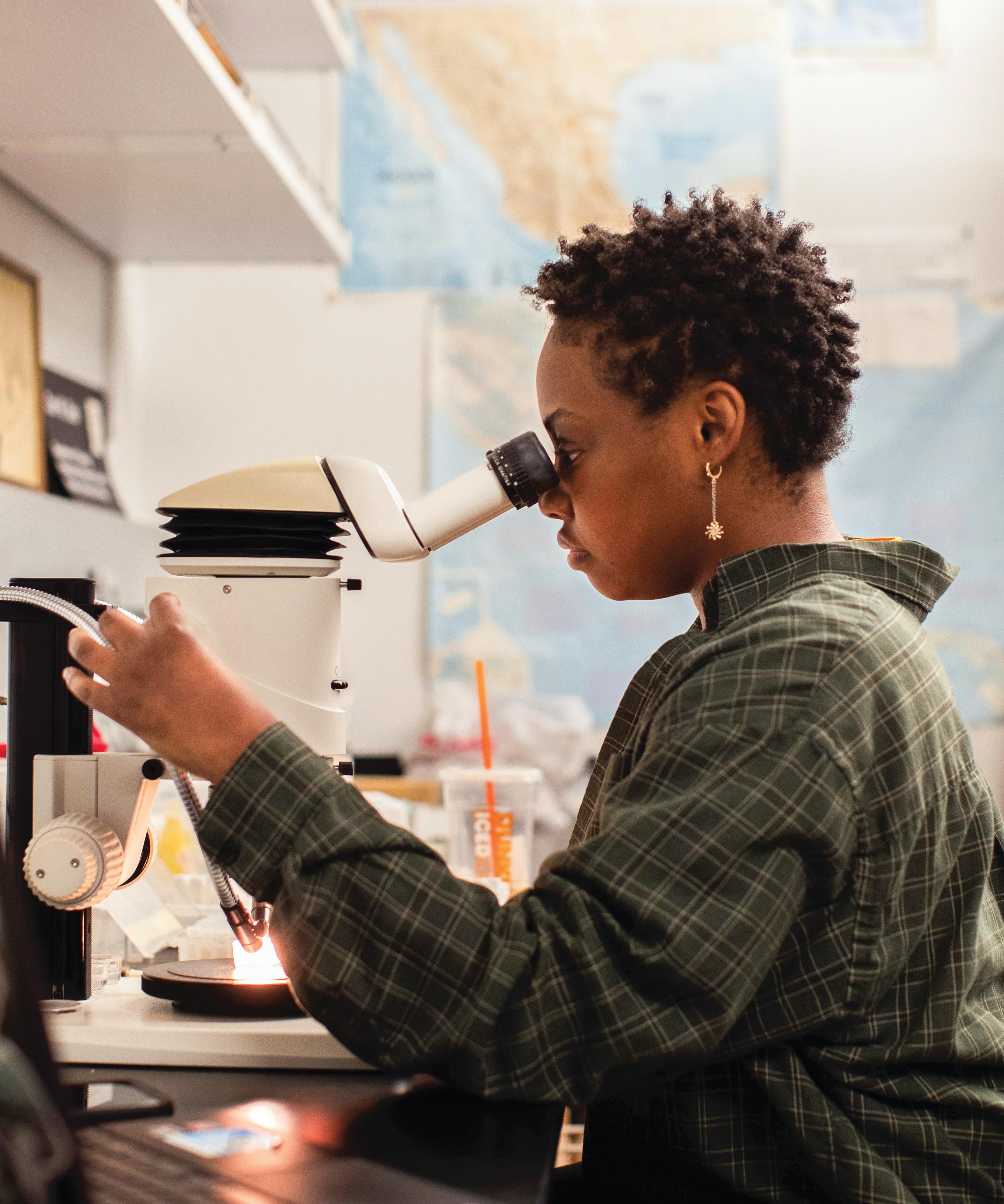
Fountain Square’s ongoing transition
‘Moneyball’: Class takes unique look at statistics

APRIL 8 - MAY 5 , 2024
SCIENCE | TECHNOLOGY | BUSINESS
Page 09
Page 15



Schedule a tour today We provide 1, 2 & 3 bedroom apartments
There’s room for you at the Drake!
726 Cumberland Trace Road - (270) 779-1026 - thedrakeapartmentliving.com
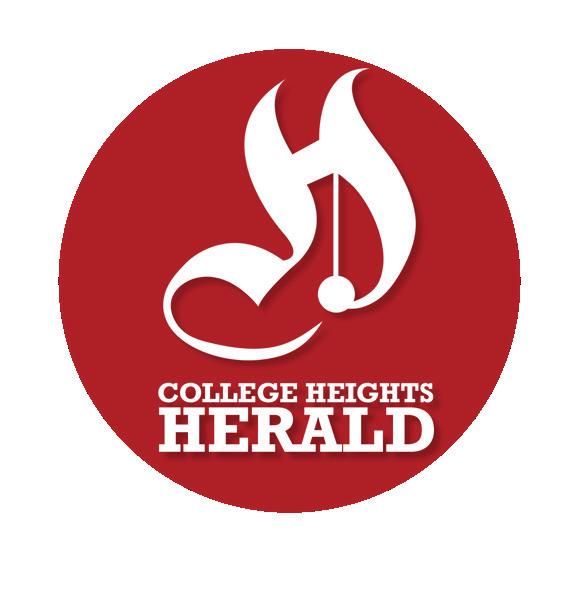
• YouTube: wkuheraldvideo
• Tiktok: wkuherald
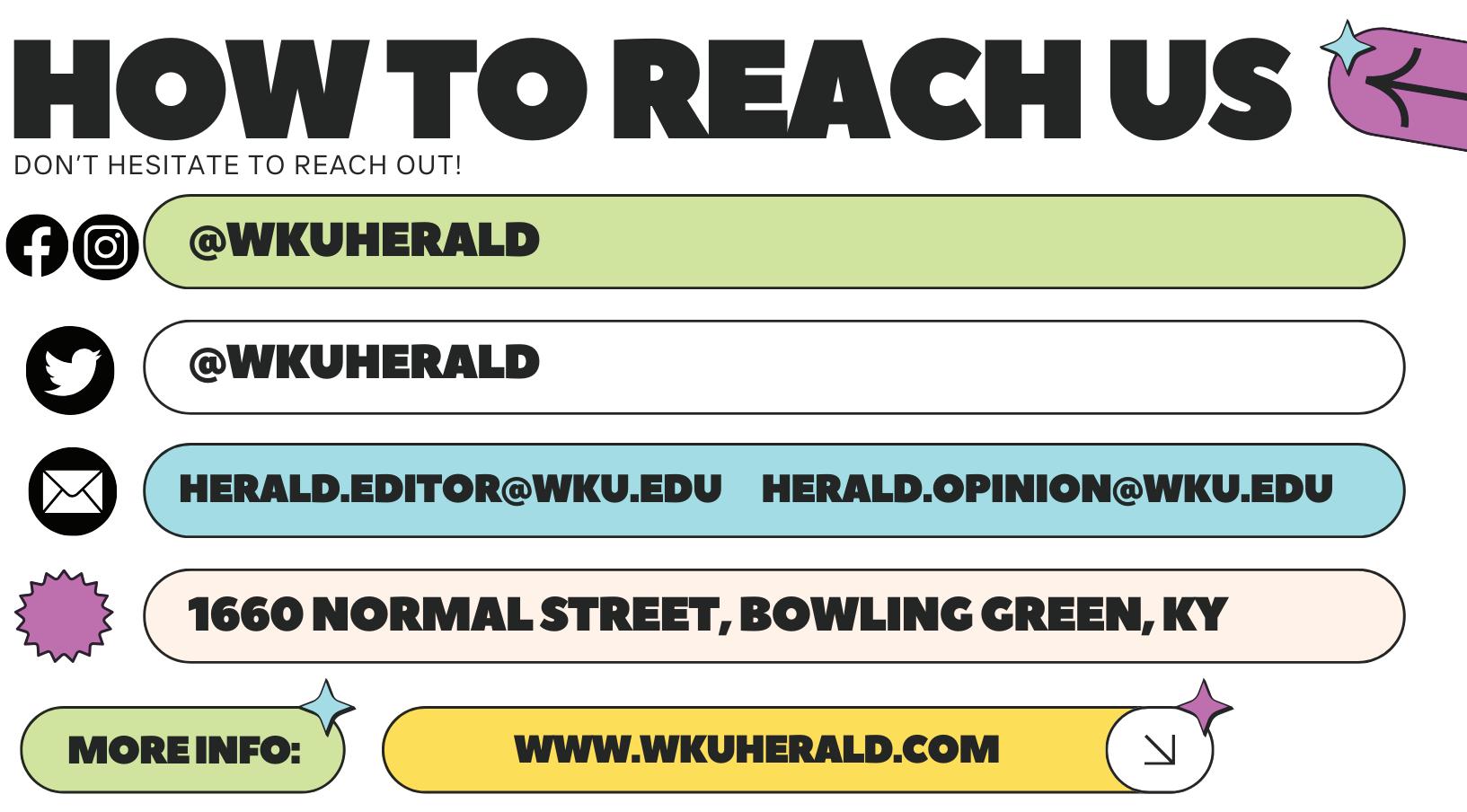
Biology graduate student Monae Taylor observes an ectoparasite known as a bat fly underneath a microscope in professor Carl Dick’s lab on the ground floor of the Ogden Science Hall at WKU on March 27. Taylor specializes in observing bat species and related organisms to understand their nature, “I am just really addicted to bats,” Taylor said. She hopes to understand why bat fly parasites are found on bats in some locations, but not others.
CONTENTS LETTER FROM THE EDITOR Print edition published three times each semester by WKU Student Publications at Western Kentucky University. First copy: free | Additional copies: $5 Alexandria Anderson Editor-in-Chief Dominic Di Palermo Photo Editor Debra Murray Engagement Editor Ella Galvin Design Editor Jake McMahon Sports Editor Caroline Chubb Video Producer Molly Dobberstein News Editor Ali Costellow Assistant News Editor Price Wilborn Commentary Editor Emmy Libke Social Media Editor EDITORIAL BOARD Emma Bayens Bailey Brush Cherry Creative Directors Abby Loftus Advertising Manager Carrie Pratt Herald Adviser Wes Orange Advertising Adviser and Sales Manager Chuck Clark Student Publications Director OTHER LEADERS AND ADVISERS POLICIES Opinions expressed in the College Heights Herald are those of student editors and journalists and do not necessarily represent the views of WKU. Student editors determine all news and editorial content, and reserve the right to edit or reject submissions. CONTACT US REPORT AN ERROR: herald.editor@wku.edu 270-745-5044 NEWSROOM: herald.digital@wku.edu 270-745-2653 or 270-745-5044 ADVERTISING: herald.advertising@wku.edu 270-745-6285 LETTERS TO THE EDITOR: herald.opinion@wku.edu ON CAMPUS: Adams Whitaker Student Publications Center, 1660 Normal St. ONLINE: WKUHerald.com NEWSLETTER: WKUHerald.com/newsletter SOCIAL MEDIA:
X:
•
@wkuherald, @wkuheraldsports • Facebook, Instagram: WKUHerald
VOLUME 99 ISSUE 6 04 WOMEN IN STEM MAKE ADVANCES 05 08 15 18 21 TURNOVER ON FOUNTAIN SQUARE ‘CAN A BASEBALL TEAM REDUCE THEIR GOALS TO A MATH PROBLEM?’ STUDENT BUSINESS OWNERS SHARE EXPERIENCES BIKEWALK BG, WKU CHHS OFFER CHANCES FOR A HEALTHY LIFESTYLE
SMITH
COVER PHOTO BY VON
LETTER FROM THE EDITOR
Hi everyone!
This issue, the last one of this semester, looks at how science, technology and business all influence our lives — as students and as people. As a biology major, this is something I’ve wanted to tackle since becoming editor, and I am proud to share what we’ve come up with.
Through my time as editor-in-chief this year, we’ve produced six amazing issues, alongside strong digital news coverage every single day. Although I won’t be returning to this position in the fall, I’ll still be writing, and I am passing the editor-in-chief torch to Price Wilborn, whose leadership skills are undeniable.
As this academic year comes to a close, I want to thank all our readers for supporting us and our content — which ultimately, is produced just for you, the communities of WKU and Bowling Green. And I want to thank my editorial board and the entire Herald staff for the phenomenal work they’ve done, and for always having faith in me as their leader. I’m so happy to have had a role in the legacy of this publication.
For the final time, I hope you enjoy this issue!
Sincerely,
Alexandria Anderson Editor-in-Chief
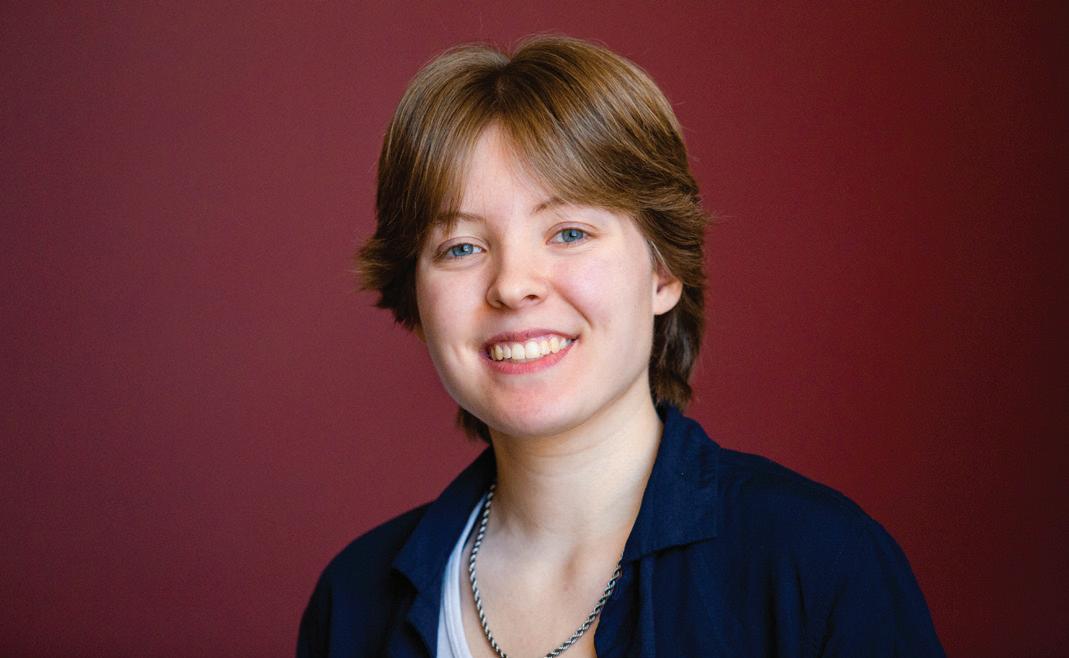 PHOTO BY CARRIE PRATT
PHOTO BY CARRIE PRATT
‘CHANGE THE CONVERSATION’ WOMEN IN STEM MAKE ADVANCES
Story by Alexandria Anderson
Walking into an introductory biology course in Snell Hall at WKU, the demographic makeup of its students may surprise those from outside the department. They are mostly women.
It is well-known that since the development of science, technology, engineering and math fields, the discipline has been male-dominated. According to the U.S. Census Bureau, in 1970, women made up 8% of the STEM workforce. By 2021, that percentage increased to 35%, but still hasn’t reached half.
Yet on a collegiate level, women have outnumbered men. Every year since 1981, more women than men have acquired bachelor’s degrees, and in 2018, 53% of STEM bachelor’s degrees were granted to women, according to the National Science Foundation.
At WKU, the Ogden College of Science and Engineering has seen steady growth in the number of women
enrolled. In Fall 2022, female students made up 42% of the college’s enrollment, and 10 years prior, they made up 37%, according to the WKU Fact Book.
On a departmental level, however, female and male enrollment differences are more stark – both across the nation and at WKU. In the WKU biology department, 68% of students are women. In the School of Engineering and Applied Sciences, only 16.3% of students are.
Margaret Crowder, WKU senior instructor in geological sciences, has a doctorate in educational leadership, where she focuses on women in STEM. She said one reason why women in STEM tend towards the life sciences, specifically healthcare, could be because women are traditionally viewed as caretakers. Students that grow up seeing women in these roles, from a personal and a historical perspective,
Photos by Von Smith
could influence the type of career they go into.
“You’ve got more women who have been in the [healthcare] field, more women who are role models in the field, whereas in things like physics, engineering, geology … then you don’t have the history of females progressing through those decisions, so you don’t have as many role models that people are able to see,” Crowder said.
She attributed part of her success in the geological sciences, a more male-dominated field, to having a female advisor during college, someone she felt represented herself.
“You need to be able to see yourself being successful in what it is that you’re looking at doing and what you’re thinking about,” Crowder said. “And if you’ve never seen anybody that looks like you doing that, it’s a very difficult thing to think about tackling.”
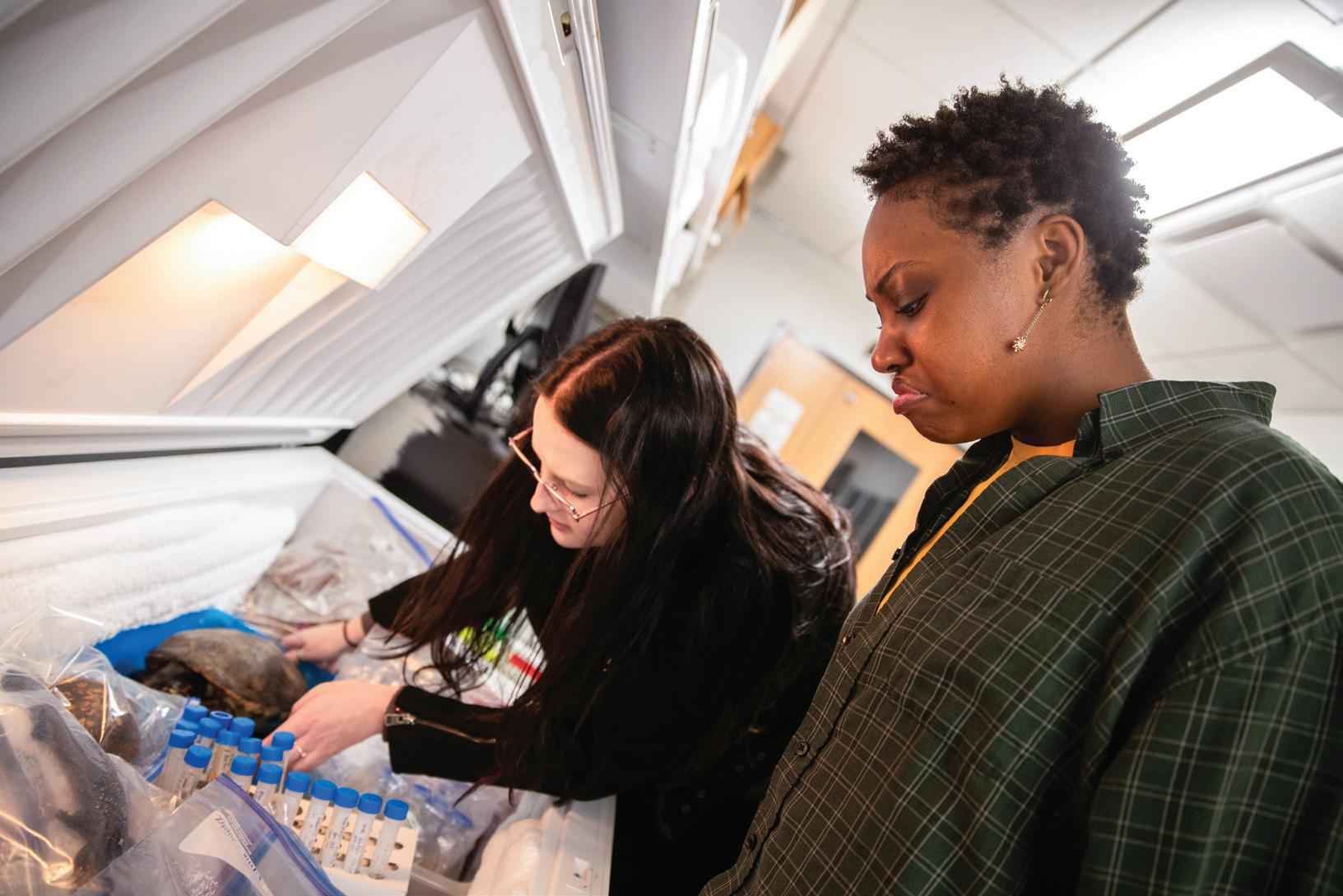
Despite increasing numbers of women in some academic STEM programs, Crowder described the overall discrepancy in gender demographics between undergraduate programs and those who become high-ranking professionals – a phenomenon referred to as the “leaky pipeline.”
“Women come into college at higher rates,” Crowder said. “You’re seeing that in your classes. We see women do exceptionally well … [But] when it comes down to who students are seeing in the classroom, especially a full professor in the classroom, very few women as a whole are in those positions. And there’s a lot of reasons behind that.”
This concept describes the loss of women in STEM in academia, as well as the lesser numbers of women that compete and are chosen for significant roles, promo-
05
Biology graduate students Monae Taylor (right) and Amy Willis (left) search for a dead bat in a freezer full of frozen animal carcasses used for biology research at the Ogden Science Hall biology lab at Western Kentucky University on March 27.
tions or tenured faculty rank. Crowder said while a portion of this could be individual life choices, some of it is also “externally imposed.”
For example, for women who wish to have children, the timeline is usually the same as working towards a tenured position. Crowder said, in general, a woman may have to take off more work than a man would to have or take care of a child. She said this could potentially cause men in the same positions as their female counterparts to look like they’ve done more, resulting in more promotions, raises and grants.
“It is a woman who carries the baby, and that is time that is stress on your body, and not just for nine months,” Crowder said. “That takes time away from whether you’re in school, or whether you’re in the job force … But also now you’re on the tenure clock. So being able to take time off of the tenure clock, to not have that count against you, because the amount of time that a woman may be off work or maybe caretaking with the child is time that a man may be able to have continued productivity.”
Crowder believes the commonality of women having an “extra load” of caretaking –whether for a child, a relative, or for a home – contributes to the leaky pipeline.
“It is unpaid and unrecognized labor that women do in the workforce of society,” Crowder said.
posed to be nurturing, why is this class hard?’” Crowder said.
Alongside this, women in STEM may have other marginalized identities that could further create barriers in their academic careers and the workplace. Crowder explained this should also be taken into account when thinking about the gender gap in STEM.
“We’ve got to change the conversation,” Crowder said.
said in her specific experience in the natural resources field, it may be difficult for women because of favoritism shown to men.
“I think a lot of times, it’s a male dominated field, and people tend to want to hire people based on that,” Taylor said. “However, I’ve noticed that a lot of people who hold high ranking positions, who happen to be male and who have been given all of these different opportunities, don’t necessarily have the qualifications that they should in order to hold those titles.”

She said sexism in the workplace is another external contributor. This includes female employees or students being more harshly graded or judged, being called “bossy” or similar terms if they speak up and being purposely excluded from the camaraderie of male coworkers. Crowder referenced these judgements potentially showing up in semester professor evaluations completed by students.
“Women are graded lower, they are ranked lower than males on equal work. Because, you know, ‘what, you’re sup-
Monae Taylor, a biology graduate student at WKU, explained that to her, it is vital for those going into STEM fields to have the opportunity to see people like themselves in the discipline.
“If you’re not thinking about the people that aren’t in your community, you’re only going to engage with the people in your community,” Taylor said.
Taylor completed her undergraduate degree in Wisconsin, and is now working on her master’s degree at WKU. She
Reflecting on her experience in the natural sciences, Taylor speculated that “harder sciences,” such as physics or engineering, may pressure women out because of the way they’re expected to act within a predominantly male field.
“Women have to try to assimilate in order to be welcomed into these communities. And that should not be the case,” Taylor said. “That’s the main point I’m driving home, where it’s just like either you assimilate or you get pushed out. That is underneath a lot, that can go for your gender, your race, in the sciences. A lot of the time you do have to assimilate in order to not seem like a threat. That could be another reason as to why we’re not seeing as many women in these fields, because even if they are qualified … They’re more or less getting pushed out because they’re not ‘one of the guys.’”
During her time in the discipline, Taylor has seen a greater push for diversity. She said in her own experience, other women have been the most vocal when including people of different races and acknowledging the need for a diverse STEM workforce.
“I think they care because they also are disenfranchised because they’re women in male dominated field,” Taylor said. “I just have that extra, you know, I don’t want to call my Blackness a hurdle. But it’s an extra element that
06
An ectoparasite known as a bat fly is observed through a microscope in professor Carl Dick’s biology lab at Western Kentucky University’s Ogden Science Hall on March 27. Bat flies are known as a host specific parasite, meaning they only rely on a specific species to survive. Dick’s students study bat flies from all over North and South America to better understand bat behavior and local biodiversity.
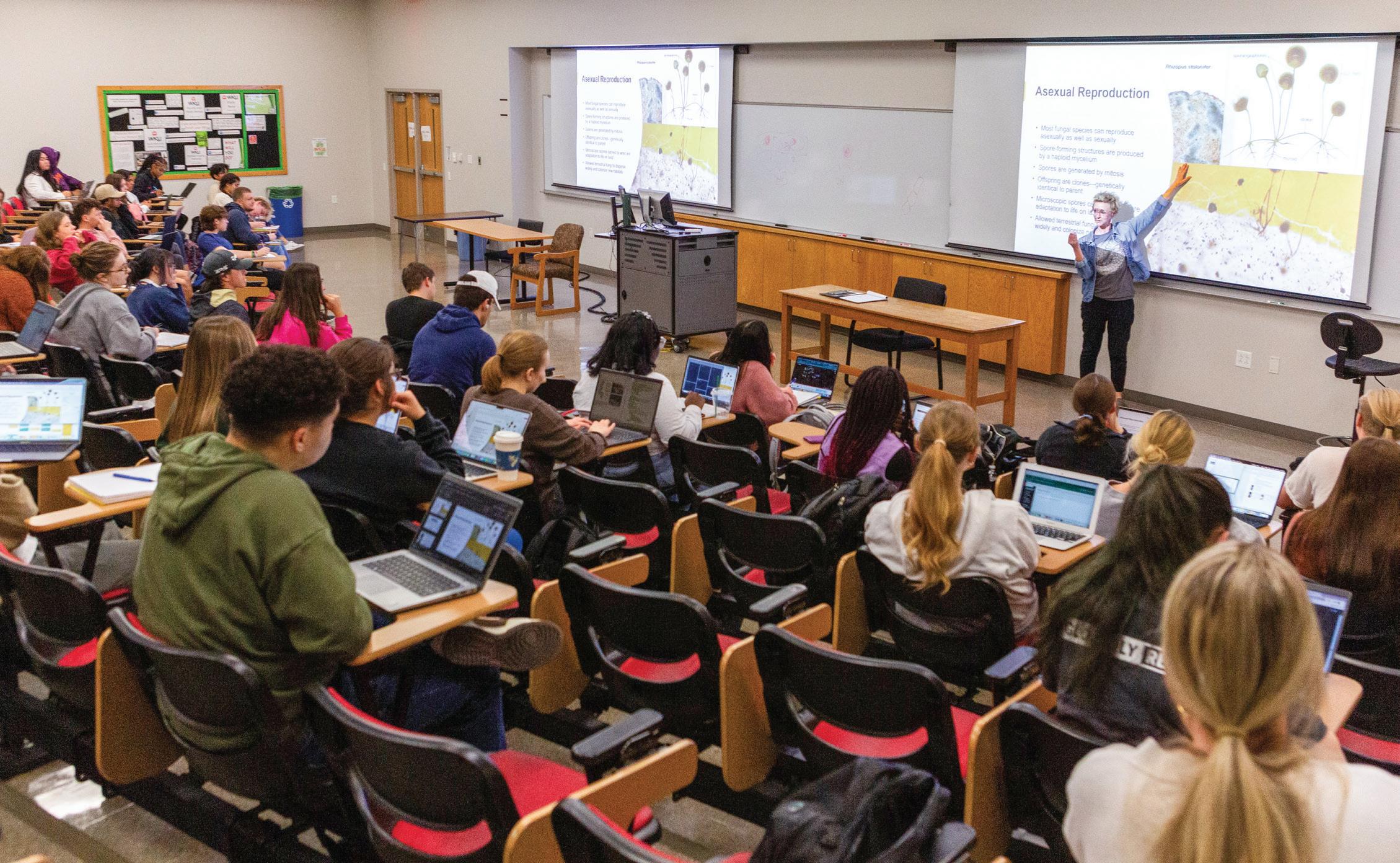
makes things a bit more tough. So again, even though right now it’s a little bleak, these conversations are happening and I felt very included, at least with the women that I’ve spoken to about this issue.”
In the WKU physics and astronomy department, women make up 30.3% of student enrollment. Jasminka Terzic, physics professor, said the key to continually increasing female enrollment in physics and similar fields is to offer exploratory opportunities and clearly present all potential career paths to students.
“They [women] feel they’re isolated because a lot of times they are going to be minority, and so exposing them, for example, going to a conference and really hearing from people that are doing different things,” Terzic said.
Terzic is the faculty adviser for the Women in Physics club and also oversees the Physics Olympics, which promotes physics to high school students.
“I think doing all these programs, I think it’s like small steps,” Terzic said. “… Working in research, having that support program with Women in
Physics and then even with the Physics Olympics.”
Terzic is one of two female faculty members in her department. Although the department is predominantly male, she has not experienced any issues and has felt supported as a woman in physics.
“I know that [in] other places people do experience issues, and I think if you look for support, you can find it and regardless of even not having a female in that department, even the men are already willing to help, you know, putting themselves in your shoes,” Terzic said.
President of Women in Physics, Hannah Kramer, is a physics and science and math education double major, and said since the department is “so small,” it doesn’t feel that heavily male dominated. She then said clubs like her own are still essential for promoting women to join the discipline.
“If you’re not seeing people like you, it’s easy to just think, ‘oh, people like me don’t do that,’” Kramer said. “Having those opportunities for women in physics, having a club which, ironically, a lot of guys come to … they want
to be supportive of us. It’s not like it’s a female exclusive, but more like just shows people that ‘you’re welcome.’”
WKU biology professor Joseph Marquardt, who graduated from WKU in 2010, agreed on the importance of female students having opportunities to see other women in the field.
“I think we’re now in a new generation where the rises started to happen when I was a student, and they’re coming to fruition,” Marquardt said. “It’s giving upcoming female students that drive to say, ‘yes, I am represented, I can do this’ whereas before, there were plenty of students that I’m sure – I’ve never had this experience – but I’m sure there was some trepidation of ‘I don’t see people that represent me. Can I do this?’ And that might be shifting now.”
However, Marquardt suggested that the high percentage of biology students being women is also tied to the decline of male student enrollment. From 2018 to 2022, the biology department saw a 24.2% decline in total enrollment, and the college as a whole saw a 16% decline. Since 2012, female biology
07
Professor Natalie Mountjoy holds an introductory biology lecture in Snell Hall at Western Kentucky University. Mountjoy is one of the three female faculty members in the biology department.
student numbers have stayed slightly over or under 400, while male student numbers have mostly declined.
“I think the drive to succeed has not left the female population, they still have that drive, the inspiration to be better than maybe their parents’ generation or further, but the male students are being drawn away to other things,” Marquardt said. “I think it’s a little bit of both positive side, more representation, but also less males.”
Marquart said the wide percent difference between male and female biology students is visible in his larger lecture courses, especially when comparing it to his own WKU experience.
However, WKU biology faculty are primarily male. While the department is working to increase representation on a faculty level, Marquardt said initiatives to get women into STEM shouldn’t wait until their undergraduate careers.
“I think we shouldn’t wait this long,” Marquardt said. “I have a daughter that’s going to be 9. I want her to think that she can do whatever she wants. And there shouldn’t be any explicit or implicit things that are keeping her away from doing what she wants.”
OCSE Dean David Brown said the college is trying to represent all groups, whether that is through recruiting
students, celebrating student work, performing fair job searches and ensuring all faculty and staff are recognized and valued.
“Most of our academic programs include significant numbers of women students, for which we’re truly proud,” Brown stated via email to the Herald.
In regards to differences between departments, Brown stated it shows us that “STEM is not inherently oriented to any one gender, or, for that matter, any group of any kind.” He stated historical disparities in STEM were reflections of the past societal values surrounding the disciplines.
“Scientists, as humans, are likely to never be altogether free from social norms and expectations and how they shape our interests, which is part of why STEM has been so disproportionately male in the past,” Brown stated. “But growing numbers of women across many STEM fields make me hopeful about an increasing acceptance of science - and all intellectual pursuits - as gender neutral. And I hope we are growing to recognize scientific curiosity as intrinsically humane.”
Hilary Katz, WKU biology professor, said discrepancies in marketing towards girls versus boys at a young age can influence what field they decide
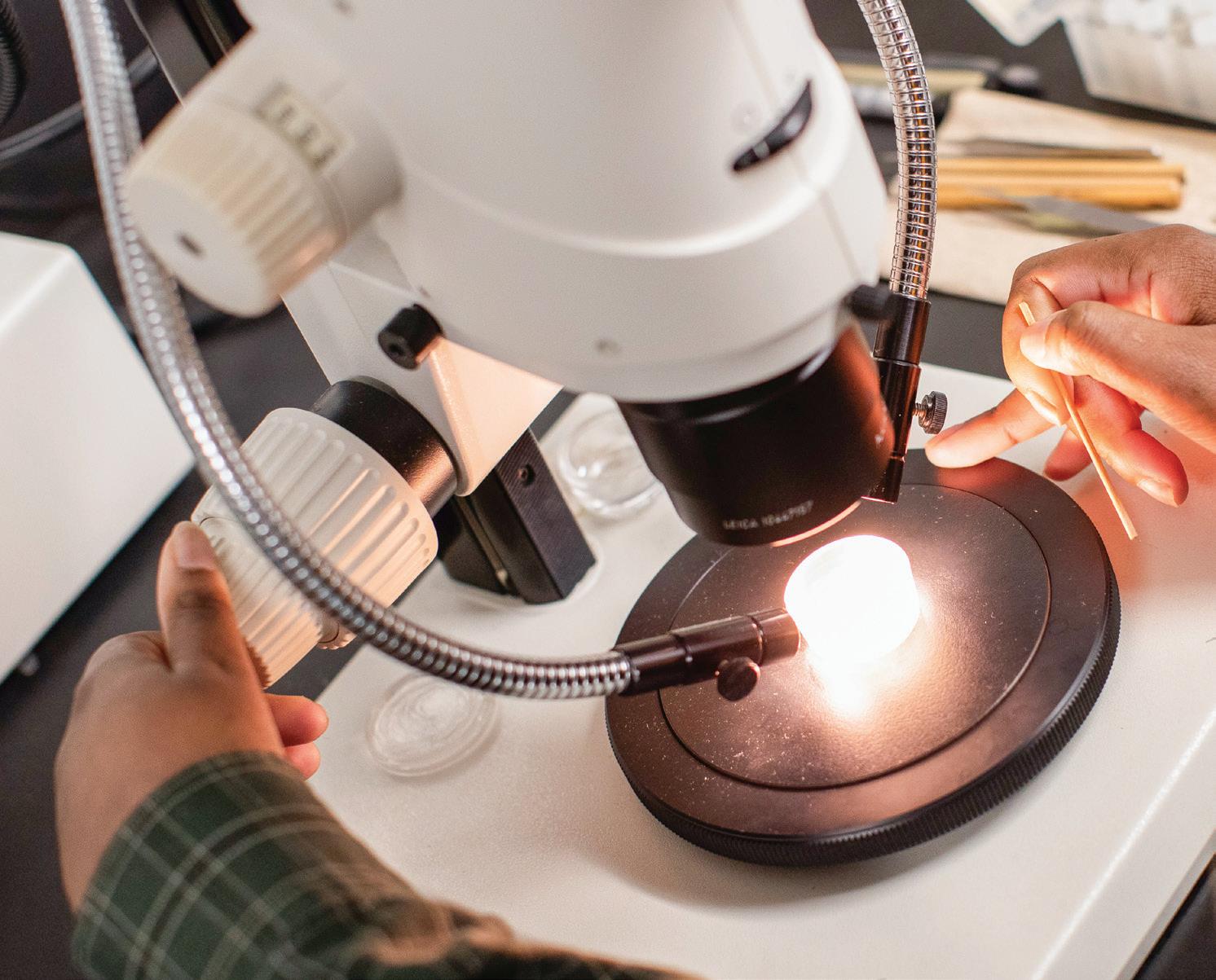
to go into, contributing to how some disciplines seem gender-specific.
“I think a big part of what leaves individuals to decide what their career goals are is their own experiences,” Katz said.
Since there have been greater increases in women in biology, Katz said this diversity has made it “less of a hump to get over” to continue making the field more inclusive.
“I think, you know, once you have more diversity within a group, it’s just easier, there’s less of that gap, there’s less of that intimidation factor,” Katz said.
Despite this, Katz said women in biology and other STEM fields could still face discrimination, whether internal or external. She said this is seen when women are less likely to apply for “reach positions” than men, or when women have to choose to attend or work at an academic location where they will feel safe.
Like Marquardt, Katz referenced how the “faculty makeup” of the biology department doesn’t reflect the “student makeup” at this time. She is appreciative that the department has acknowledged this and will continue to grow to improve its diversity.
“I think the really important thing is that we recognize that there’s room for growth and we’re actively working to improve our community,” Katz said. “And I think that’s the most important thing, is that when you see there are problems, you acknowledge them and just work to improve. The worst thing you can do is just nothing.”
Editor-in-chiefAlexandriaAnderson can be reached at alexandria.anderson337@topper.wku.edu.
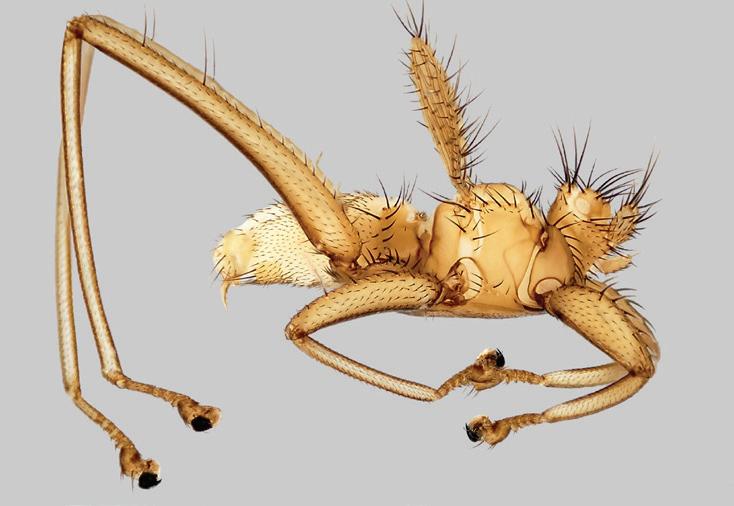
PROVIDED BY CARL DICK
Image of bat fly species Megistopoda aranea, parasite of the leaf-nosed bat species Artibeus jamaicensis in Panama. Bat flies like this one live only in the fur of bats, where they feed on blood.
08
Biology graduate student Monae Taylor adjusts a light on her microscope while studying bat fly specimens in Carl Dick’s biology lab at Western Kentucky University’s Ogden Science Hall on March 27.
TURNOVER ON FOUNTAIN SQUARE: LOCAL BUSINESSES SHARE CONCERNS AND SUCCESS STORIES
Story by Mariia Novoselia
A coffee shop, a vintage clothing store, a health food restaurant and a candle store – what these four places have in common is not just their location, but their effort not to succumb to business turnover on Fountain Square.
Located in the heart of downtown Bowling Green, Fountain Square Park has been the subject of travel guides, local history books and newspapers since its opening in 1872. In over 150 years of its existence, the Square has hosted and let go of a plethora of businesses, including law firms, furnishing stores, Asian restaurants and much more.
On May 27, 1994, the Bowling Green Daily News published a news story titled “City’s downtown continues flow of businesses.” In an interview with reporter Stan Reagan, Cheryl Mendenhall, Downtown Business Association executive director at the time, said
“Downtown has always had a natural attrition – some businesses fading away as others take their way.”
Currently, more than 100 businesses are located on the Square and the streets adjacent to it, Telia Butler, downtown development coordinator, said.
According to the City of Bowling Green website, one of the goals of the Downtown Development Division that Butler leads is to grow “existing Downtown assets appealing to young professionals, growing families, and anyone seeking a vibrant Downtown experience.” Butler said she also hopes to connect Downtown with the rest of the city, including Western Kentucky University and Southcentral Kentucky Community and Technical College.
The Downtown Development Division was created in December 2021, Butler said. Some of her team’s
achievements since that time include raising $75,000 for Duncan Hines Days, a weeklong celebration held in June, as well as $12,500 for Light Up BGKY, receiving a $50,000 grant from General Motors Foundation that will be used later this year for new public art installations around downtown, launching the Fountain Row entertainment district and hosting familiarization tours of downtown.
Additionally, Butler said she works with downtown business owners and those who consider starting a business there, connecting them with the right government services they may require, such as the code compliance for complaints or licensing and permits for business operations. She also advocates for downtown businesses and communicates with them regularly via a monthly e-newsletter and a GroupMe chat.

09
Downtown businesses on the Square pictured on March 26.
Photos by Wyatt Reading
One of the people that Butler works with is Amber Brooks, owner of Becky Brooks Vintage. Located at 432 E Main Avenue, the store sells thrifted vintage clothing, shoes, jewelry and other curious finds like teacups and decorative embroidery.
Brooks opened the brick-and-mortar version of her store on March 19, 2021, after a few years of selling clothes online via an Etsy shop. She said thrifting was just one of her hobbies at first – until she started finding things that “were almost too good to leave behind.” Several years later, picking clothes for the store is still her favorite part of the business.
“I love the thrill of the hunt,” Brooks said.
Brooks has lived outside of Kentucky, however, after returning to the commonwealth in 2019, she wanted to build relationships within the community, which is why she decided to open a physical store. She said she was lucky to have “a nice landlord” who helped her find a good spot – one that did not require a lot of renovations.
Brooks’ responsibilities, however, go far beyond hunting for clothes. Her week usually consists of many tasks that include laundering, setting prices and doing the books. Brooks works together with Brandy Tucker, or “the yin to [Brooks’] yang” and “the bread and butter of the shop.”
“She is dependable, reliable and great with the customers,” Brooks said.
“I got really lucky with my first shop employee.”
Tucker said she had been alongside Brooks since her Etsy shop days, and that one of her favorite things about working on the Square is getting to talk to different customers.
“The view isn’t bad, and being from here, it’s really special to be able to see the Fountain every day, but also, it’s the mix of people that you encounter – you have your locals that just hit the downtown shops, but then you have a lot of visitors,” Tucker said.
Some of the challenges that businesses downtown face revolve around the Square not always being “on your beaten path,” Tucker said. She added that since getting around the area may not be easy, people often need to plan to spend time downtown.
Brooks said some of the obstacles that the store faces are connected to the economy.
“We’re discretionary income. Nobody, technically, needs vintage clothes. It’s an amazing choice to buy sustainable options; they are amazing products because they are well made and last longer. But at the end of the day, it’s not food, rent, or utilities, so when people’s budgets tighten, clothing is one of the first things to go,” Brooks said. “So, that’s hard, as inflation has grown.”
Some months, she said, have been “tighter” than others. For example, when heavy snowstorms swept through
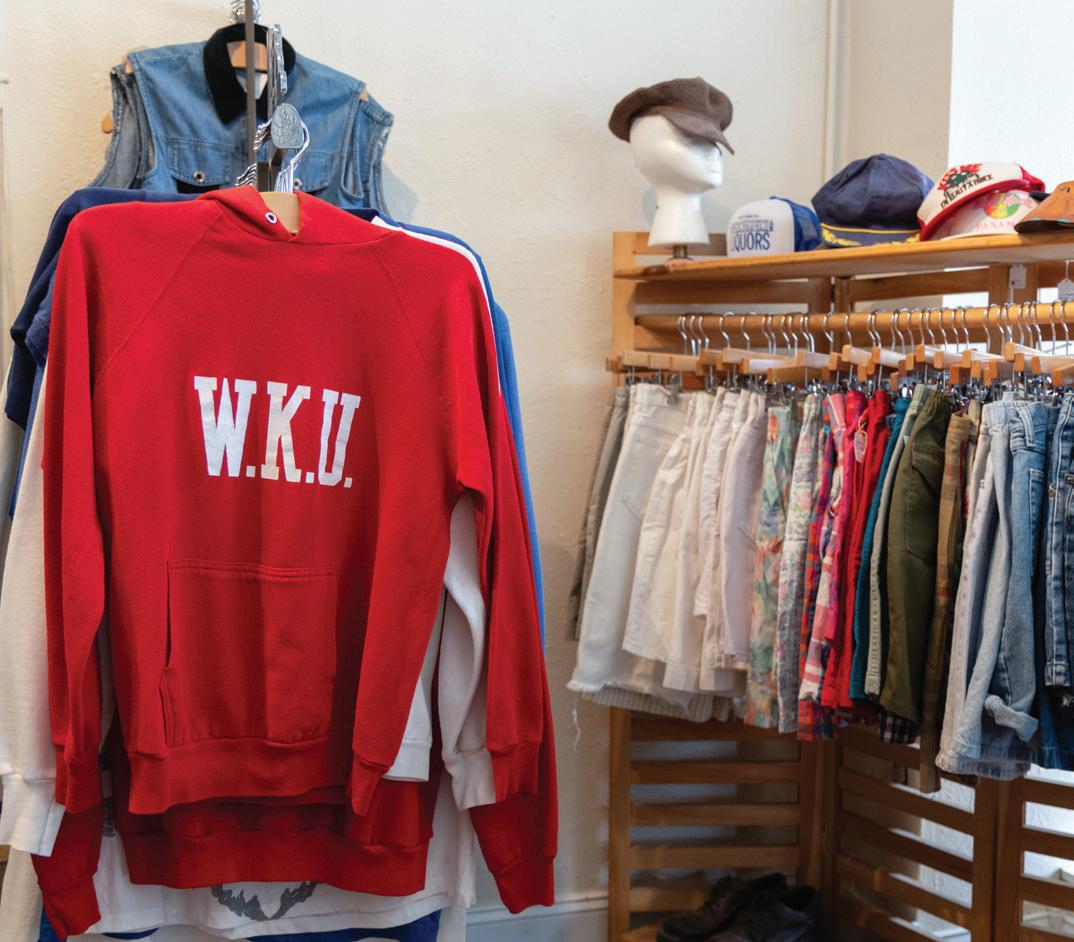
Bowling Green at the beginning of January 2024, Brooks had to close her store for two weeks.
“Personally, I have never taken out a loan or a grant, so if the shop doesn’t make it, then I’m either not paying myself or I might even have to put in a little of my own money,” Brooks said. “I think that’s fine for a year or two but ... it’s not viable to do that forever.” However, Brooks added that because her business started as an online store, she was able to save some money as a buffer.
In addition, Brooks said a restricting factor for businesses downtown is growing prices for rent.
Butler said the only property owned by the City of Bowling Green downtown is the park, the sidewalks and the streets. She said buildings and properties on the Square belong to private landowners and monthly rent rates range from $1,500 to $3,000 and beyond, depending on the size, amenities and other features.
Across the street from Becky Brooks Vintage, right in the middle of the Square, is the Hebe fountain, erected in May 1881, according to the City’s website. Hebe, the goddess of eternal youth, as well as the fountain she is perched upon, has gone through several restorations. The construction is surrounded by four sculptures: Ceres, Pomona, Melpomene and Flora, the goddesses of grain, fruit, tragedy and flowers respectively.
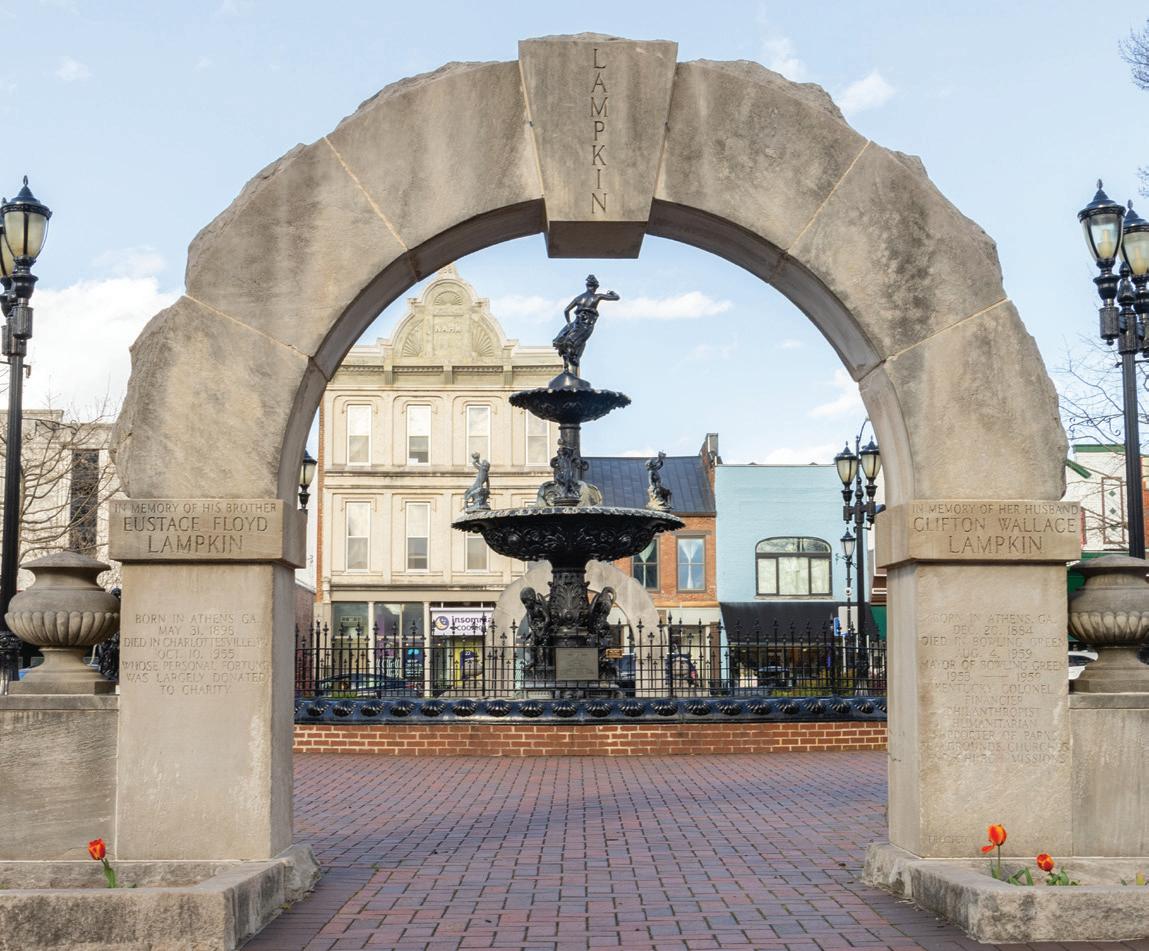
10
A WKU hoodie on the rack inside of Becky Brooks Vintage on March 27. Fountain Square Park pictured on March 26.
On the other side of the road from Bowling Green’s Olympus, situated at 415 Park Row, Candle Makers on the Square lures customers in with an array of scents. Emily Summar, the daughter of Rachel Summar, who owns the business, said her favorite thing about Candle Makers is getting to hear personal stories about what different candle scents mean to people.
“Smells are so nostalgic, it’s a kind of a love language,” Summar said. “You can get somebody a candle, and it can completely take them back to a time that was good for them.”
Aside from selling the candles that Summar and the rest of the team make, the store also hosts workshops on candle pouring and does “fills.” Summar said customers are welcome to bring in their own jars that the store will fill with a candle.
As Bowling Green natives, the Summars were big fans of candles, the square and the store even before they bought it from previous owners in March 2020, right as the COVID-19 pandemic was unfolding.
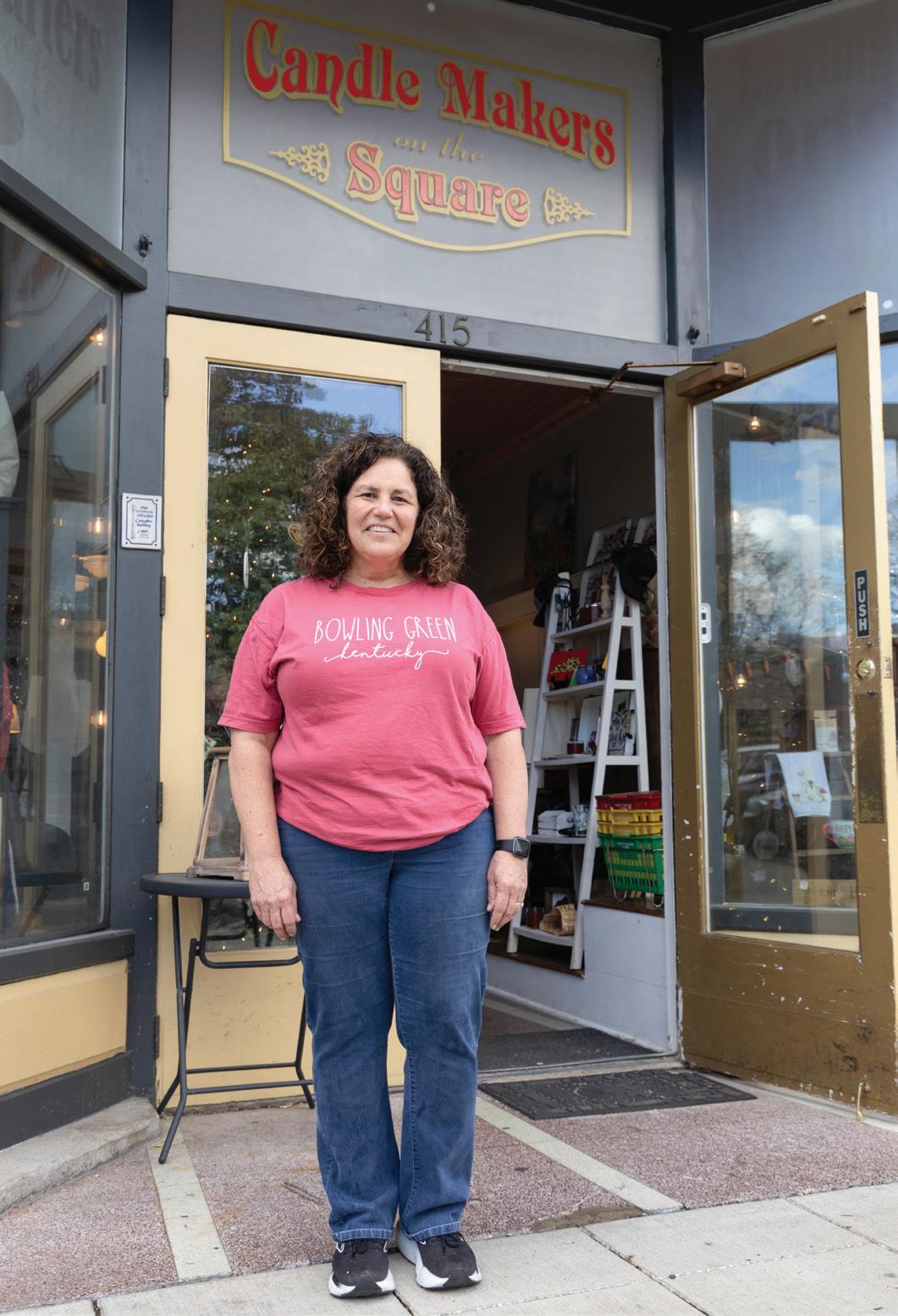
“People always ask if it was harder for us, but because we had just started with the pandemic, we really didn’t know anything different,” Summar said. “We were just looking at previous numbers that had come in from the last owner, and it was already doing a lot better.”
While the pandemic may not have been the biggest challenge, something that Candle Makers is struggling with is small spaces for work and parking, Summar said. Like the owner of Becky Brooks Vintage, she added that a challenge that some businesses on the Square face is rent.
“We’ve been really lucky to have a separate landlord than a lot of other stores on the Square. She’s been pretty lenient with us about keeping rent the same,” Summar said. “But then if they’re just raising the rent so that only certain businesses can stay – it’s really hard to see places that are staples like Little Fox go, and you know that they’re doing so well on the Square, but they
just can’t keep up with the rent.”
Something that Summar said she wishes Candle Makers had known about earlier is grants. Currently, the team is looking for financial support for women-led businesses.
“There’s money there to keep local businesses going, because I think people really want to see local business,” Summar said.
Butler said one of her goals is to establish “an official 501c3 downtown nonprofit to make more downtown grant funding and sponsorship fundraising more accessible for our downtown businesses and the downtown experience overall.”
A few paces down the street from Candle Makers on the Square is one of the newer additions to the community of downtown businesses – The 30 Bird. Born in 2018, the business sells “Whole30 Approved and compatible, Paleo, vegan, and vegetarian snacks, sides, and meals,” according to the
store’s website.
Evy Lantz, WKU senior majoring in psychology with a minor in behavioral clinical communication, works at The 30 Bird, and said Ann Scott, founder and owner of the business, had a lot of success on the Bypass, which is why she decided to open another location at the Square in October 2023.
Lantz works with Piper McIvor, a sophomore at South Warren High School. McIvor said her favorite part about working on the Square is getting to meet different people. Lantz added that working at The 30 Bird has taught her healthier ways of making food.
One of the challenges that the business is facing currently is that not enough people know about The 30 Bird and the kind of food that the business serves, she said.
“A lot of times people will come in for the first time and be really confused,” Lantz said. “There are obviously businesses down here that are very established and will stay forever, like Spencer’s, but then I feel like people don’t like to venture out to the new things on the Square.”
In 2023, Spencer’s Coffee sold 138,000 lattes, making it the most popular and in-demand drink, according to the 2023 Spencer’s Coffee Wrapped, published on the business’s Instagram page. Currently, there are three Spencer’s Coffee locations in Bowling Green, with the oldest one located at 915 College Street.
Justin Shepherd arrived in Bowling Green in 1999 to pursue a bachelor’s degree in journalism at WKU. He then got a job at Bowling Green Daily News, where he worked as the weekend editor. Tuesdays through Thursdays his shifts started at 6 a.m. and ended at 2 p.m. On Fridays and Saturdays, however, Shepherd would work from 3 p.m. until 1 a.m., which proved to be unsustainable long term.
A regular customer at Spencer’s Coffee, he said he knew the owner of the business, and in 2005, Shepherd and his wife decided to buy the coffee shop.
11
Owner of Candle Makers On the Square, Rachel Summar, outside of the store on March 26.
“I didn’t know what I was doing. I had no business experience, no real training in food or management – none of that stuff,” Shepherd said. “It was a really stupid decision, but it worked out.”
His typical week now consists of meeting with the operational director, fixing issues that may pop up at different locations, greeting employees and connecting with customers, as well as reading and doing research on ways to improve the business and make the people who work at Spencer’s Coffee feel supported.
“I don’t spend a ton of time behind the counter, like I did in the beginning, but now I have the privilege to work on the business and help all of my team members do what they do best,” Shepherd said.
Spencer’s Coffee went from four employees to 65 total, with approximately 20 working downtown, Shepherd said. He said at first, what brought him fulfillment was “creating a place [he] would want to exist if Bowling Green didn’t have it.”
Now, one of his favorite things about leading the business is “seeing customers find their place” at Spencer’s Coffee and “having the opportunity to help team members develop professionally.”
Just like the other businesses on the Square, Spencer’s Coffee has had to overcome some challenges over the years.
“Running an independent business in the age of Starbucks and Amazon is just a challenge for anybody,” Shepherd said. “A challenge in downtown, in particular, is there’s no ability to add a drive-through, and we don’t have a bunch of parking places dedicated to our building.”
Shepherd said that contrary to residents of more metropolitan areas, most of the population in Bowling Green is not used to parking several blocks away and then walking to their destination. This is what Butler calls not a “parking,” but a “walking problem.”
“There is ample parking. More parking spots equal less space for business, commerce, and gathering spaces,” Butler said. “Nowhere else in the city is the City expected to provide free public parking for private businesses except the Square because ‘it’s always been
done that way.’ There are over 1,200 free public parking spots that are government owned and managed, that do not tow, within 2-3 blocks of all the downtown parks and major venues – that amount exceeds the typical number of parking spots for a city this size. Downtowns are meant to be walkable, you’re supposed to walk.”
The issue of parking spaces around the Square has been in the papers for almost as long as the Square itself. For example, on July 16, 1956, the Courier-Journal published a news story by Harry Bolser titled “Park at Bowling Green Unlikely to Be Converted to Parking Lot,” which explained that although some businesses and civic leaders suggested turning Fountain Square into a parking facility, city officials, including Mayor Lampkin, turned this idea down.
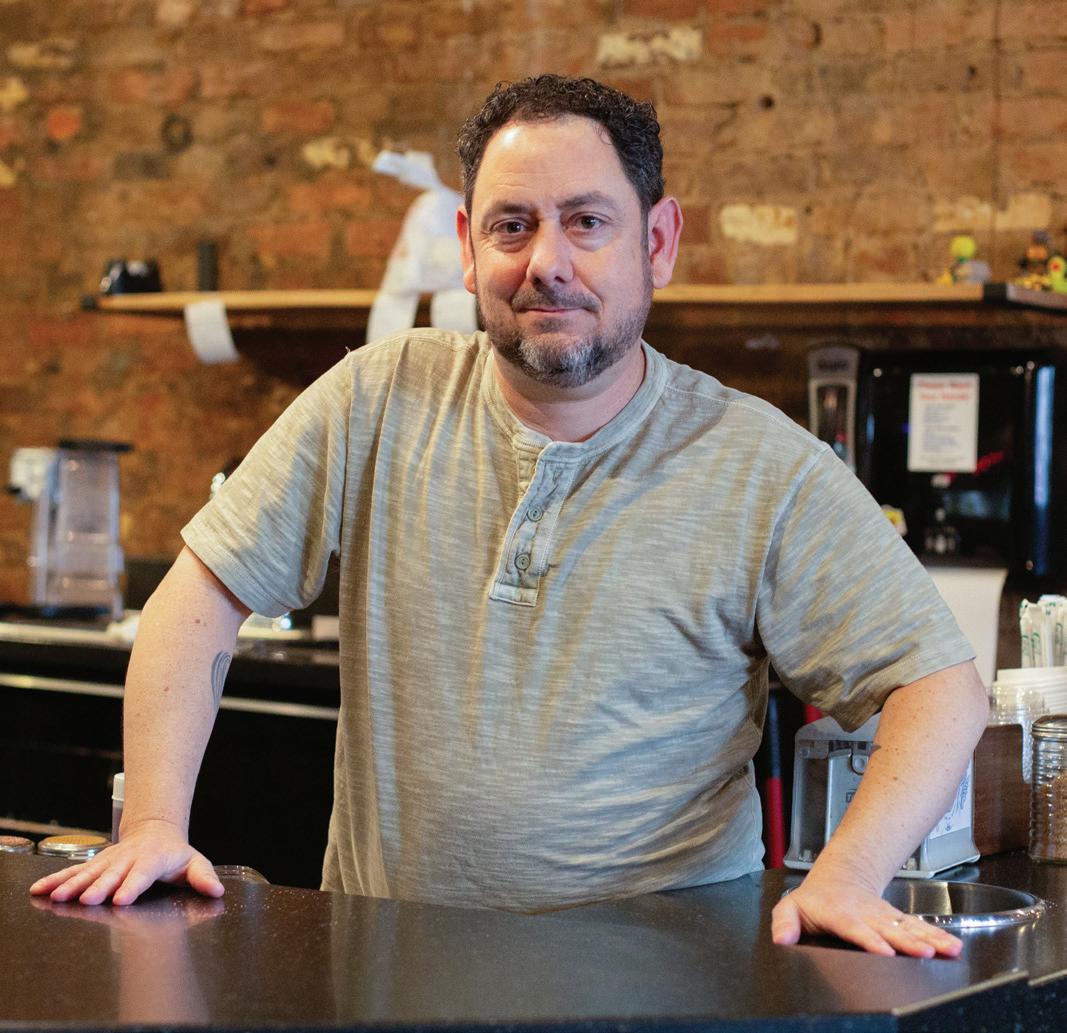
is a misconception about the activities that downtown offers.
“The perception that there’s nothing to do downtown is based on a thought process that’s nearly 20 years old because SKyPAC, the Ballpark, Circus Square and the parking structure were built over the past 12-15 years,” Butler said.
Butler said that her division conducted research on the two “busiest summer nights to determine our real traffic developments and infrastructure needs.” She said the results of “a minute-by-minute” traffic survey that took place from 5 p.m. to 10 p.m. on the night of a Hot Rods game, a Broadway show at SKyPAC, a film festival at the Capitol and a Concerts in the Park event at Circus Square Park indicated that the parking structure was full for 20 minutes.
“All the other downtown free parking lots were open, and the structure was only ‘unavailable’ for the peak 20 minutes of all 4 events happening at the same time. The other public free lots like BGMU, Paxton, Justice Center and its overflow and street parking were all available – and don’t tow. You just have to walk a block or two,” Butler said.
Besides parking, Butler said that some of the issues that businesses downtown face are simply false perceptions that could be overcome through education. For instance, she said there
Considering why so many businesses come to the Square and leave, Shepherd said most people in Bowling Green do not go downtown unless they have a reason to do so, which adversely affects businesses.
“With breakfast and lunch, and coffee, and pastries, and a lot of seating we offer people a reason to come frequently and multiple ways to interact with us,” he said.
Another way Spencer’s Coffee has been trying to avoid falling to the Square turnover is by creating “affordable luxuries.” Shepherd said those are the products that are not so expensive that a student would not be able to buy them, but also not so cheap that they become “cookie-cutter” and uninteresting.
“We don’t try to fit into some niche, we just try to do coffee, food, and customer service in a genuine way, and lots of people appreciate that,” Shepherd said.
NewsReporterMariiaNovoseliacan bereachedatmariia.novoselia765@ topper.wku.edu
12
Justin Shepherd, owner of Spencer’s Coffee, poses for a photo at the counter inside the shop on the square.
SOKY RENTALS OFFERS NEW APARTMENTS

As the semester comes to a close, some students are worrying about leases, apartments and where they’re going to live next year. SoKy Rentals apartments in Keystone Commons are one of the newest complexes in the area and are leasing premium units to students for next year.
Bella McKinney, a junior at WKU, said she saw several apartments before she set her sights on SoKy. She liked that she would be the first person to live in the brand new apartment unit, and she said it was very reasonably priced for a student.
“I had been through a few other apartments, and I thought it was like how they say college apartments are. But (Keystone Commons) was new, and there weren’t any issues. And they’re very pretty,” McKinney said.
McKinney said that she loves how close the apartments are to campus because she likes being on campus early to get breakfast or be early for classes.
“I could leave my house and get there in five minutes. That’s a huge thing for
me because I’d rather drive to school,” she said.
McKinney said another reason she liked the SoKy apartments was how easy the process of moving in was for her as someone who had never lived in an apartment before.
“It was a very easy process to get approved and to move in. I was very scared, but it was pretty simple,” she said.
Marina Gibson, a WKU junior who lives at the Keystone Commons, said that she loved the apartment building. She said that it was a very nice place and liked how affordable her living space was with just one other person.
She said on top of loving her apartment space, the apartment manager and maintenance are always there for her when she needs them.
“When you call them they’re there for you. They’re good at being attentive to your needs,” Gibson said.
She said that they were very helpful when she was filling out the leasing forms, answered her questions and were
very communicative during the process. She said that she likes showing off her apartment to friends when they come over.
“I’m proud of it; we’ve made it a home,” Gibson said. “I like bringing guests to show the apartment, and they equally love it. They say, ‘What a nice apartment and what do you pay?’”
Gibson said that she recommended it to juniors who were looking for their first apartments and said that she and her roommate had almost no issues.
“Everything’s worked well, and even if it doesn’t we can message them and have them here the next day,” she said.
She said another thing that helped her choose the SoKy apartments was the fact that she was allowed to have her cat with her and that she enjoys having a pet with her in the apartment.
“I want to stay here until I graduate,” she said.
Gibson said that it has been a very good experience for her and that she truly enjoys living at the apartment complex.
SPONSORED BY SOKY RENTALS
13
Keystone Commons - SoKy Rentals is located 1.4 miles from downtown nightlife and less than 2 miles from WKU.
WALK2CAMPUS: WHERE HOME MEETS COMMUNITY
Walk2Campus strives to provide a tight-knit community within a large array of housing options. With 25 houses and three apartment complexes there are options to accommodate any student’s needs.
Walk2Campus homes all have a little bit of personality, as they’ve coined the term #OurHousesHaveNames. Some of the most iconic options for people to choose from are: The Lady, The Barn, Babe Cave, Ten Woman, Holiday Inn and The Nut House. These homes are located on College Street, except The Nut House which is on Chestnut. The names of these homes offer flair and a unique place for renters to call home.
Celia Clippinger, a Nashville senior who lives in a Walk2Campus home, said her favorite part of Walk2Campus is the uniqueness of each unit.
“Each unit has its own quirks,” Clippinger said. “1538 has been lived in by students for decades, and everything is still original to the unit, from the hardwood floors to the doorways all being different widths, it just has a charm that me and my roommate were drawn to.”
Clippinger said she enjoys the freedom of being off campus, with the convenience of being less than a mile away from any building on campus. She
study rooms and attentive maintenance staff.
She said the maintenance is incredible, and any time she has put in a work order they have been at her apartment within an hour to solve the issue.
“They are always respectable of our space, for example, they make it a point to walk around our rugs when wearing their work shoes even though my roommate and I have told them repeatedly that we don’t mind,” Clippinger said. “I have a dog, and every time they stop by they bring her treats, and she absolutely loves them.”
She said that the leasing staff is just as kind, and their welcoming attitude was her deciding factor to rent through Walk2Campus.
“Once I moved in, I found myself using the study rooms weekly just so I could run into Lacey and talk with her for a few minutes. Once Kendall came on board as leasing coordinator and Lacey moved to property manager, they became my parents away from home,” Clippinger said. “I knew I could go to them with any issues I had, apartment related or not, and I would be met with support and solid advice. I can’t count the number of times I have found myself confiding in them.”
Jessica Lee, a senior from
Walk2Campus apartment, said the staff is very kind and will work with anyone to help with anything.
“They have a very homey and comfortable space and are so accommodating to whatever you need,” Lee said. “They make it so easy to live here, and I can literally just come in here and talk to them for days on end.”
She said the location of her apartment is another factor she enjoys.
“It provides a good school and worklife balance. I’m close to school, but I also live right next to Hilligans, and that’s really nice,” Lee said.
She said her apartment offers her a lot of space at an affordable rate.
“It’s very spacious, and it makes it easy to live here,” Lee said. “You can decorate however you want to and make your apartment yours.”
Clippinger said she recommends Walk2Campus to anyone looking for a home. She said the space, price and kind staff are what have made her stay at Walk2Campus three years in a row.
“I would recommend everyone to live with Walk2Campus because the amount of space you get in your unit for the price seems like an absolute steal,” Clippinger said. “Lacey and Kendall are the biggest reason on why I have resigned with Walk2Campus 3 years in a row. They truly are two of the most kindhearted and loving women I have ever met; you can tell how much pride and effort they put into their jobs on a daily basis. They know every unit and tenant off the top of their heads.”
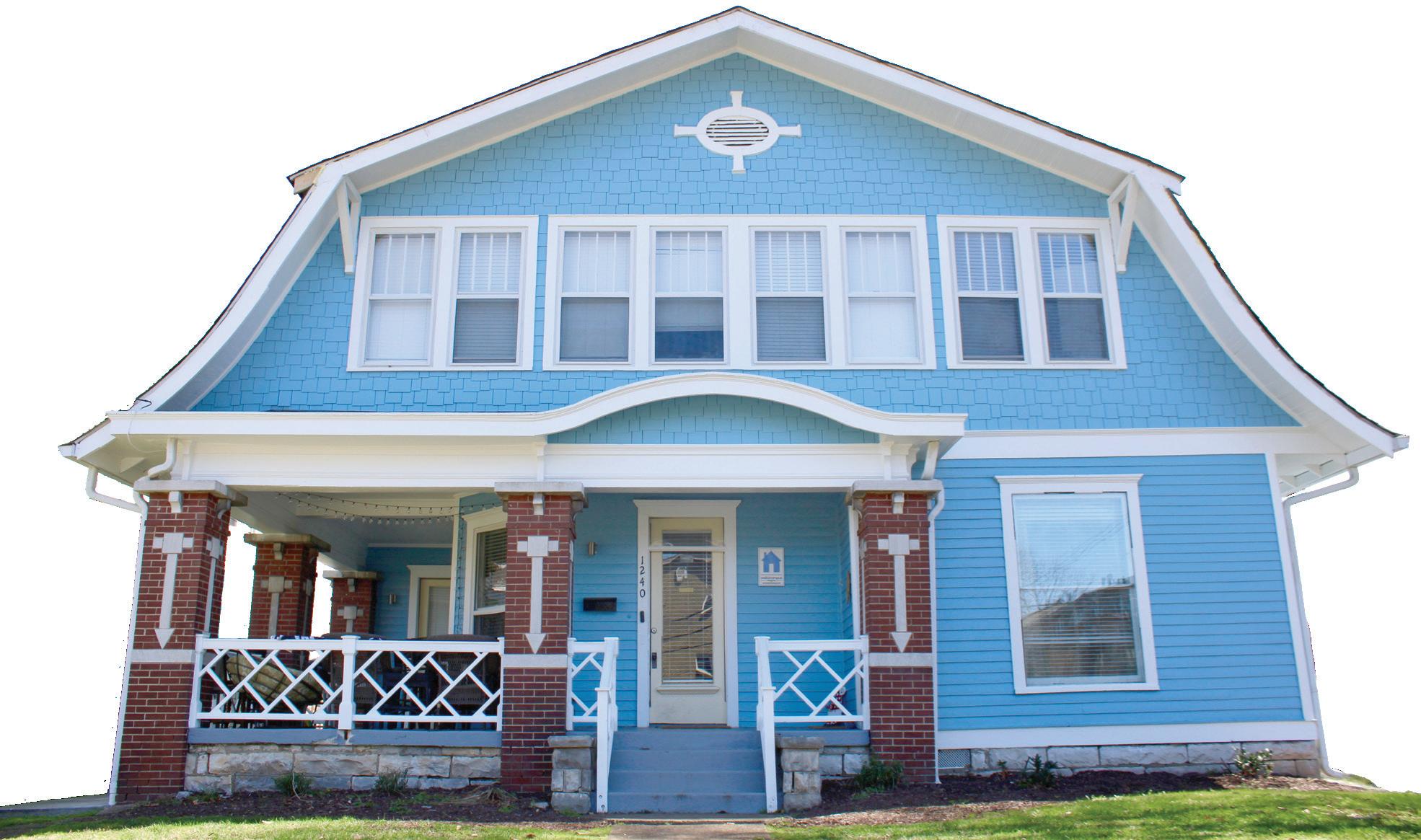
“The Barn” on College Street is one of 25 houses and three apartment complexes Walk2Campus leases near WKU’s campus. Walk2Campus has coined the term #OurHousesHaveNames to share each home’s personality.
SPONSORED BY WALK2CAMPUS
‘CAN A BASEBALL TEAM REDUCE THEIR GOALS TO A MATH PROBLEM?’
Story by Camden Bush
WKU students now have the chance to explore the world of sports analytics in a unique way: through a class based on ideas from the book and film “Moneyball.”
Adam Brownlee, WKU analytics and information systems professor, helped form the class and confirmed that it is based on the popular baseball movie and book, which are based on a true story.
“The story of Moneyball is rooted in the teachings of Bill James, a destroyer of long held beliefs surrounding the game of baseball,” Brownlee said.
The idea of the “Moneyball” course comes from the 2003 book “Moneyball: The Art of Winning an Unfair Game” by Michael Lewis, and the film “Moneyball,” released in 2011. The main concept in the book and film are the newfound idea that analytics and math
can help a baseball team develop a deeper understanding of players and baseball as a whole.
The 2023-2024 academic year marks the first time the class has been offered as a stand-alone course, but the overarching concepts of the movie have been implemented in Brownlee’s teachings for years.
“‘Moneyball’ has been working its way through my classes for years now,” Brownlee said. “Most students respond well to this pursuit, especially if they have a love for baseball.”
Brownlee said the class still doesn’t stand alone for himself, however, sports management professor Terry Obee began offering the class as a stand-alone this year.
Obee agreed to take on a role in teaching the class to help students use “Moneyball” analytic techniques in
Photos by Adin Parks
deciphering sport trends.
“The reason I agreed to teach the class is because Moneyball has put you in a situation with data analytics to be able to decipher the difference between both,” Obee said. “And if you know that, it gets you directly to the answers.”
Obee and the sports management department worked to form the class SPM 330 Moneyball: Sports Analytics based off the teachings from the movie that Brownlee implemented at WKU.
In bringing over ideas and concepts from the movie, Brownlee also added a bit of his own expertise.
“The idea surfaces from the original story of Moneyball but we’ve built out our own predictive analytic models,” Brownlee said. “Closer to home, my son plays the game so I have a vested interest.”
Brownlee has broken the lessons of
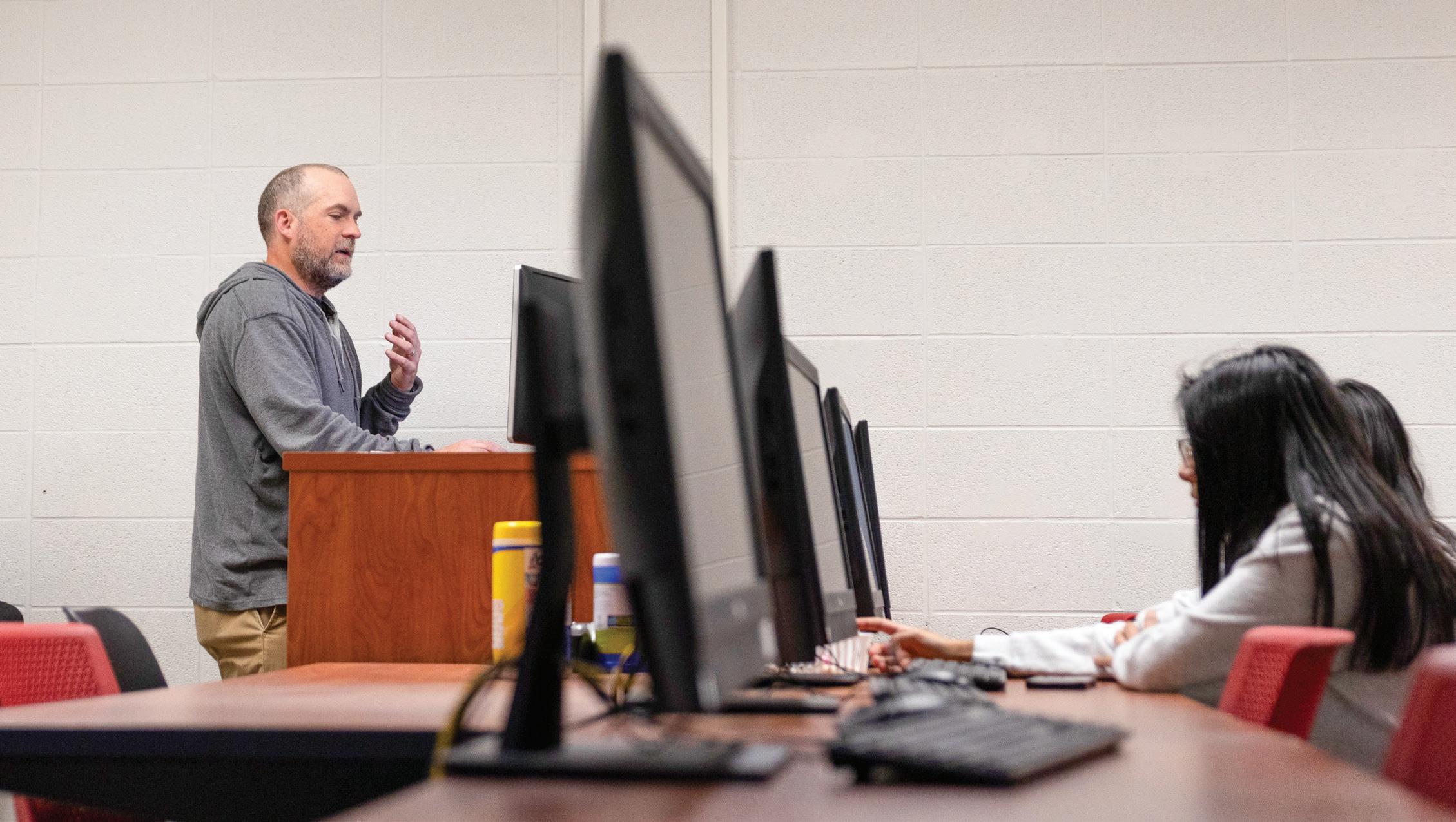
15
Professor Adam Brownlee teaches his “Moneyball” class in Grise Hall on March 25.
“Moneyball” down into three key points for his students:
First, “Data often shows us things that others miss. If you lift the hood of the car, a lot of times you find hidden value.”
Second, “If something has always been done a certain way it probably deserves to be blown up. Dogma should be fed a steady diet of hand grenades.”
Third, “Believe in yourself first. If you don’t, no one else will.”
These premises are his own, but can be closely tied to the themes of the movie.
In the film, Oakland Athletics owner Billy Beane and analytical mind Peter Brandt are given the challenge of building a successful Major League Baseball franchise in a small market. Brandt, a character based on former Athletics Assistant General Manager Paul Depodesta, introduces analytics into the franchises decisions regarding player signings, resulting in far more success.
The analytical thinking that DePodesta introduced exploded since his time with the A’s in 2002 and even since the release of the film “Moneyball” in 2011. Over the years, teams have realized that data analytics professionals can be extremely helpful in many facets of the game.
In 2015, ESPN released a feature story highlighting how every major league sports team across the four
major sports in America felt about and used analytics.
As of 2015, in the MLB for example, only two teams did not believe in using professionals to help evaluate their teams statistics: the Philadelphia Phillies and Miami Marlins.
Another prime example of the evolution of “Moneyball” data analytics ideas is featured in the 2022 Forbes article “Moneyball 20 Years Later: A Progress Report On Data And Analytics In Professional Sports” by Randy Bean.
The article includes comments from Zack Scott, who spent 18 seasons with the Boston Red Sox in a variety of influential roles, and breaks down how analytics have evolved in the MLB since the creation of the film.
“‘The growth in the application of data and analytics in baseball during the past 20 years has been extraordinary, as measured by both the levels of investment and the usage of quantitative metrics,’” Scott states in the article. “‘We’ve grown from 10,000 data points to 10 billion data points during this time.’”
The class has been a hit with students to this point. Senior Paul Warrell, recreation administration major, took the class because he was “interested in sports data and what makes good athletes good” and that he “also was interested in projecting success or regression for players.”
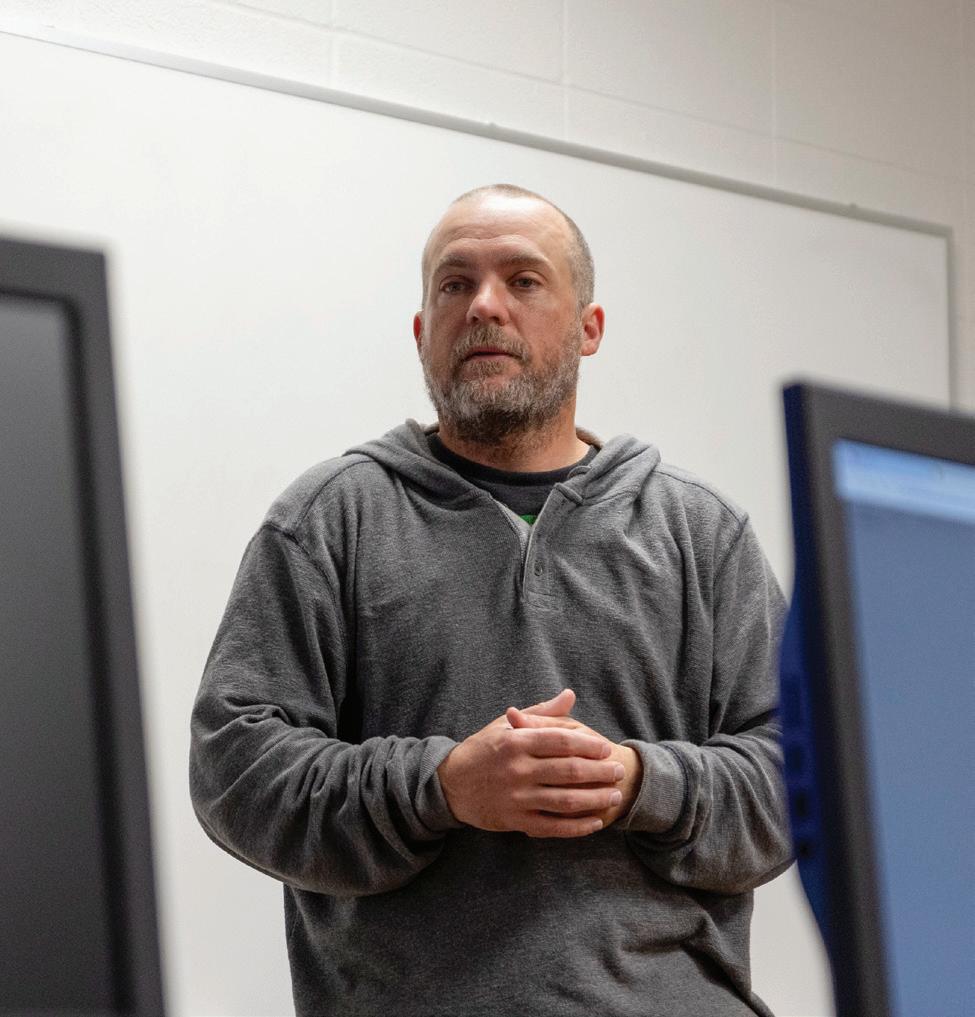
and helpful.
“Originally, we set out to recreate the work of Paul DePodesta and the Oakland A’s who asked, ‘can a baseball team reduce their goals to a math problem?’ Yes, they sure can,” Brownlee said.
Another unique aspect of the Moneyball content that Brownlee and Obee offer is that the classes work hand in hand with WKU baseball, the Bowling Green Hot Rods and both South Warren high school and middle school baseball teams. The work done by students in these “Moneyball” classes helps local teams receive analytic information.
“Our partnerships surfaced because of the competitive advantage we infused– complete analytics at the local level. The question is, if a competitor has an analytics department and you don’t, are you at a disadvantage? The answer is yes,” Brownlee said.
Brownlee said the work in his class for these teams does exactly what Brandt, also known as DePodesta, did for the A’s, but even goes past what was featured in the movie.
Warell added that he has thoroughly enjoyed the class to this point.
“I have liked learning new software for data analytics,” Warrell said. “I would recommend others to take this class.”
While with the A’s, DePodesta and Beane faced many skeptics in introducing these systems of thinking into the MLB. Today, these forms of statistics are extremely popular and are viewed as vital by almost everyone involved in sports.
With the evolution of these thinkings, Brownlee decided incorporating some of these teachings to his classes would be fun
“Through regression analysis DePodesta honed in on the variables that were most important to winning ball games and the A’s reached their goal of making the playoffs,” Brownlee said. “We do the same for our teams except we stretch out beyond the original models and deliver on regression analysis, binary response models, impact and response variables, decision trees and wOBA optimization models. All of this simmers to a predictive, competitive analytics boil that lifts teams to more wins. If you can tell us your on base percentage, we can tell you how many games you should win.”
Brownlee confirmed that he will continue offering the course in the future.
“Our goal is to touch on the real deal ‘Moneyball’ analytics that Paul DePodesta and the Oakland A’s kicked up,” Brownlee said. “Students should take these classes because in part, it is like walking into the front office of your favorite major league team. You get to contribute and see how things play out. It doesn’t get any better than that.”
SportsReporterCamdenBushcanbe reachedatcamden.bush770@topper. wku.edu
16
Brownlee is an Analytics and Information Systems professor in the Gordon Ford College of Business. Brownlee teaches several courses over analytics in Grise Hall alongside the “Moneyball” class.
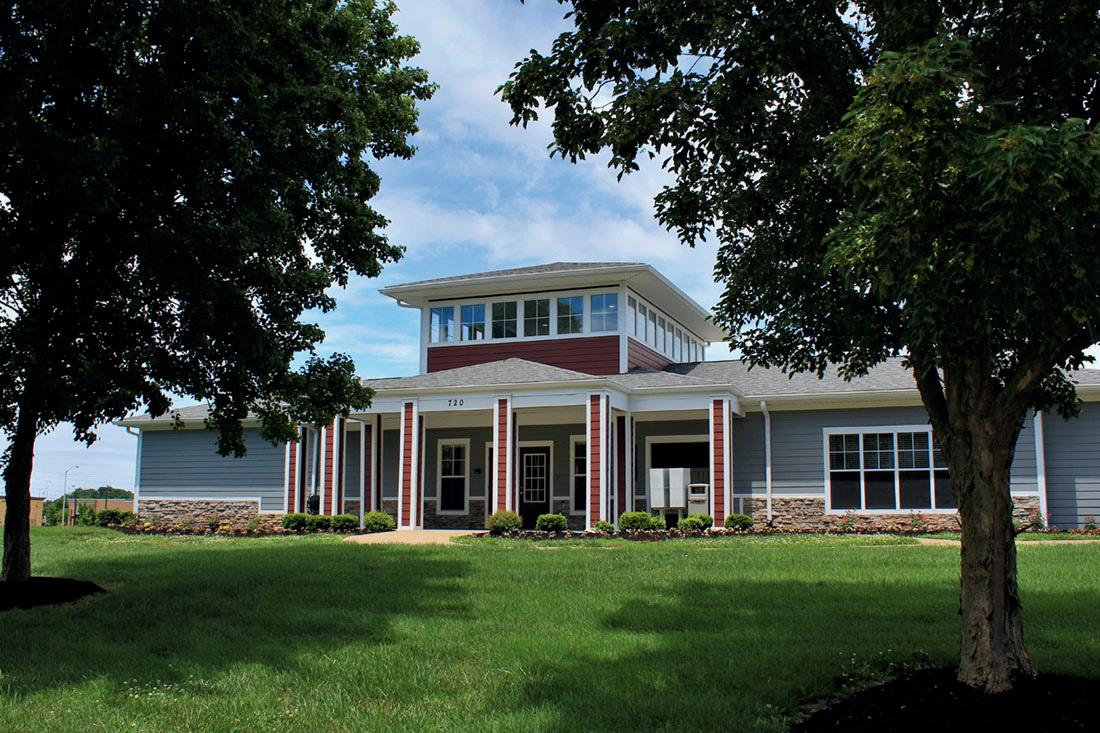


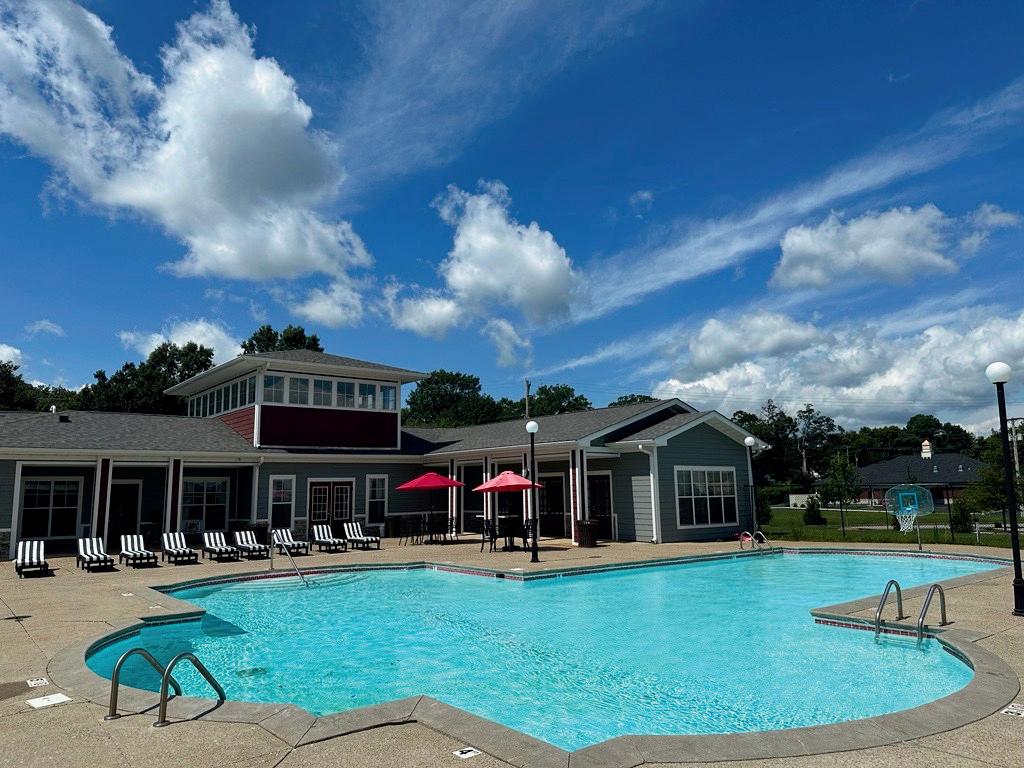
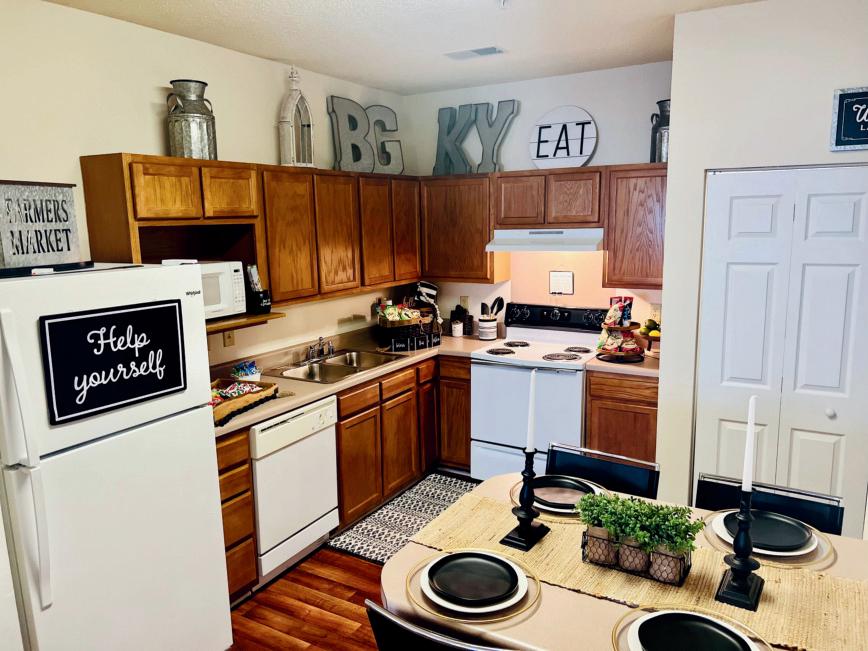
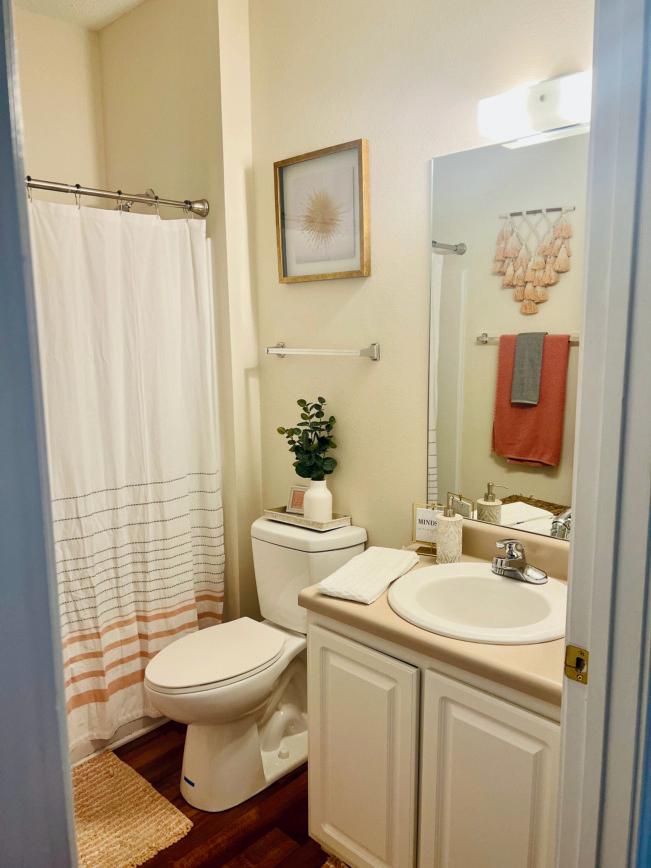
In Unit Laundry Resort Style Pool Wi-Fi Included Appliances Included Pet Friendly Free Parking The Crown Apartments is greatest in Student Style Living! The community boasts a 24/7 fitness center, clubhouse, tanning bed, resort-style swimming pool, free printing, and a dog park! ABOUT COMMUNITY 270-781-5600 www.thecrownbg.com@thecrownbg In Unit Laundry Resort Style Pool Wi-Fi Included Appliances Included Pet Friendly Free Parking The Crown Apartments is greatest in Student Style Living! The community boasts a 24/7 fitness center, clubhouse, tanning bed, resort-style swimming pool, free printing, and a dog park! ABOUT COMMUNITY 270-781-5600 www.thecrownbg.com@thecrownbg
‘JUST KEEP GOING AND DON’T GIVE UP’ STUDENT BUSINESS OWNERS SHARE EXPERIENCES
Story by Kaylee Hawkins
College students are no strangers to learning how to make a living and pay for expenses in creative ways. With the cost of attending a university rising, many have had to find new ways to keep themselves afloat.
For some, this is starting their own businesses, learning how to balance school work and keeping their business in line with competition.
Gatara Townsend, a WKU social work graduate student, has had a different approach to starting her own business by creating “Lavouss’ Cowgirl Kitchen,” selling homecooked meals and desserts.
Townsend’s mom passed away in 2016. She said cooking has helped her to feel closer to her mother’s spirit, with the name of her business being her mother’s middle name.
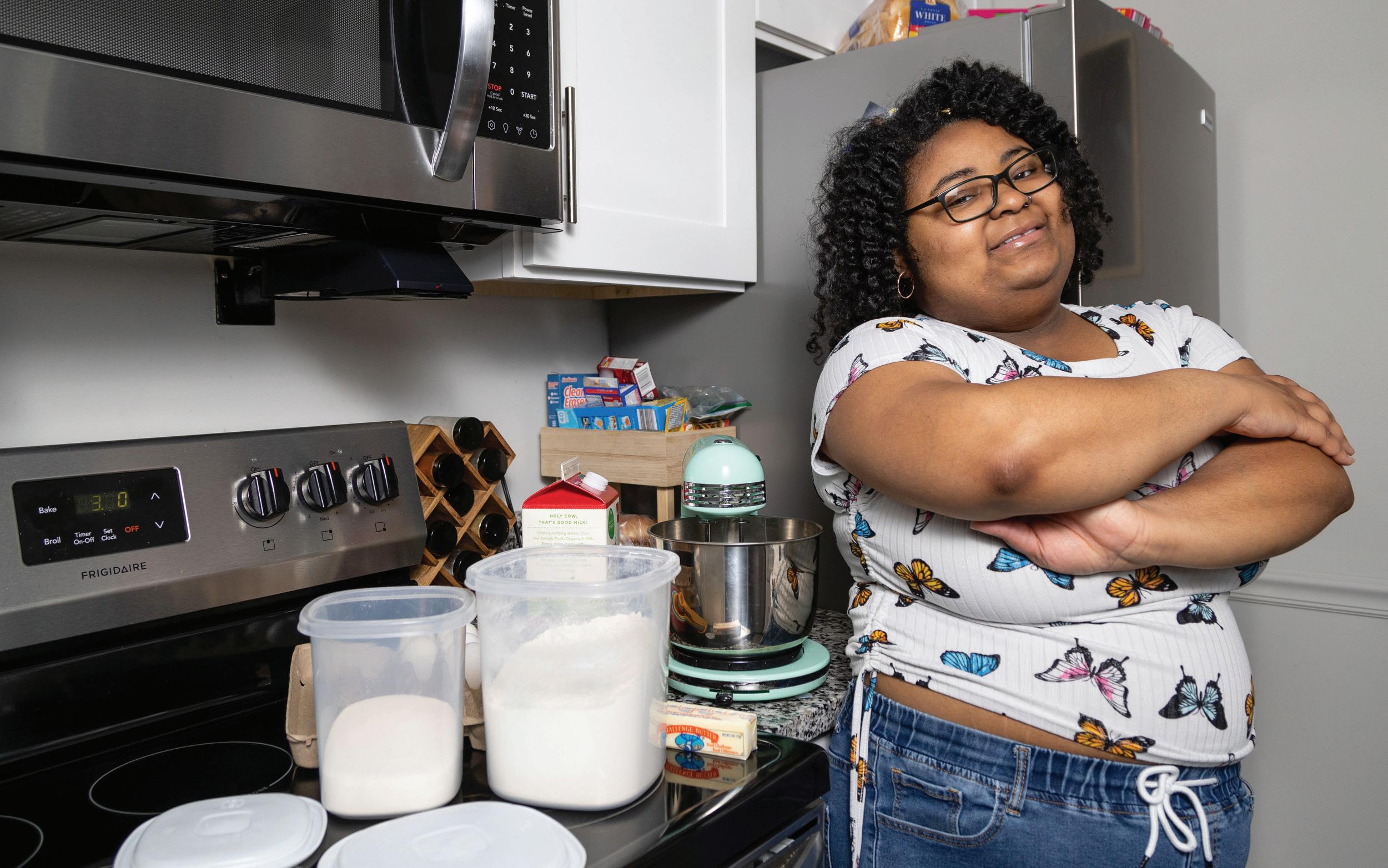
Launching her business in 2020 helped her bring in a little bit of extra income.
“It has its challenges but I feel like I’ve started to find my balance,” Townsend said. “I had to manage my time correctly because I know this is something that I love to do.”
When business is slow, Townsend pushes herself to realize that all of the hard work is going to pay off.
“Do I get discouraged? Yes … but I know that what’s for me is for me and it’s going to thrive,” Townsend said.
Her advice to others looking to start their own business is to pray on it if you’re religious, be willing to go through the challenges of having no orders and be willing to start from nothing.
The most difficult part for Townsend, however, has been getting new customers on campus and finding new ways to put herself out there.
“When people order from me, I hope that they get the sense of love that I put into my food, the sense of home because I cook a lot of soul food … being able to have the opportunity to
eat something and it bring back a good memory or create a good memory,” Townsend said.
Townsend’s menu changes every week, and prospective buyers can find her menu and order from her on Instagram @lavousscowgirlkitchen.
Similar to Townsend, freshman elementary education major Abigail Wurtman began her business with inspiration from family.
She was 13 when she started “Made with Grace,” selling T-shirts, car air fresheners, ornaments and small hand made gifts.
18
Graduate student Gatara Townsend sells home-cooked meals and desserts from her kitchen. “Cooking brings me peace and joy,” Townsend said. “It gives me the time to reflect on happy memories I have created with my mom and my aunt. It makes me feel closer to God in many ways because I also take the time to just talk to him sometimes when I cook.” Photographed in her kitchen on March 30.
Photos by Dominic Di Palermo
“I would say that my aunt was a big part [of starting my business] because she has a small business as well and I saw her really take off with that,” Wurtman said.
As Wurtman began making small gifts for family and friends and selling online, she realized she could begin to branch out and make a profit.
Her business has now made over 1,000 sales in the five years she has been a business owner. Wurtman has now begun to partner with other shops to have her items available straight off the rack.
“I’m in a shop in Munfordville, Kentucky, but I’m working on getting into more places around the area that I live in Hart County,” Wurtman said.
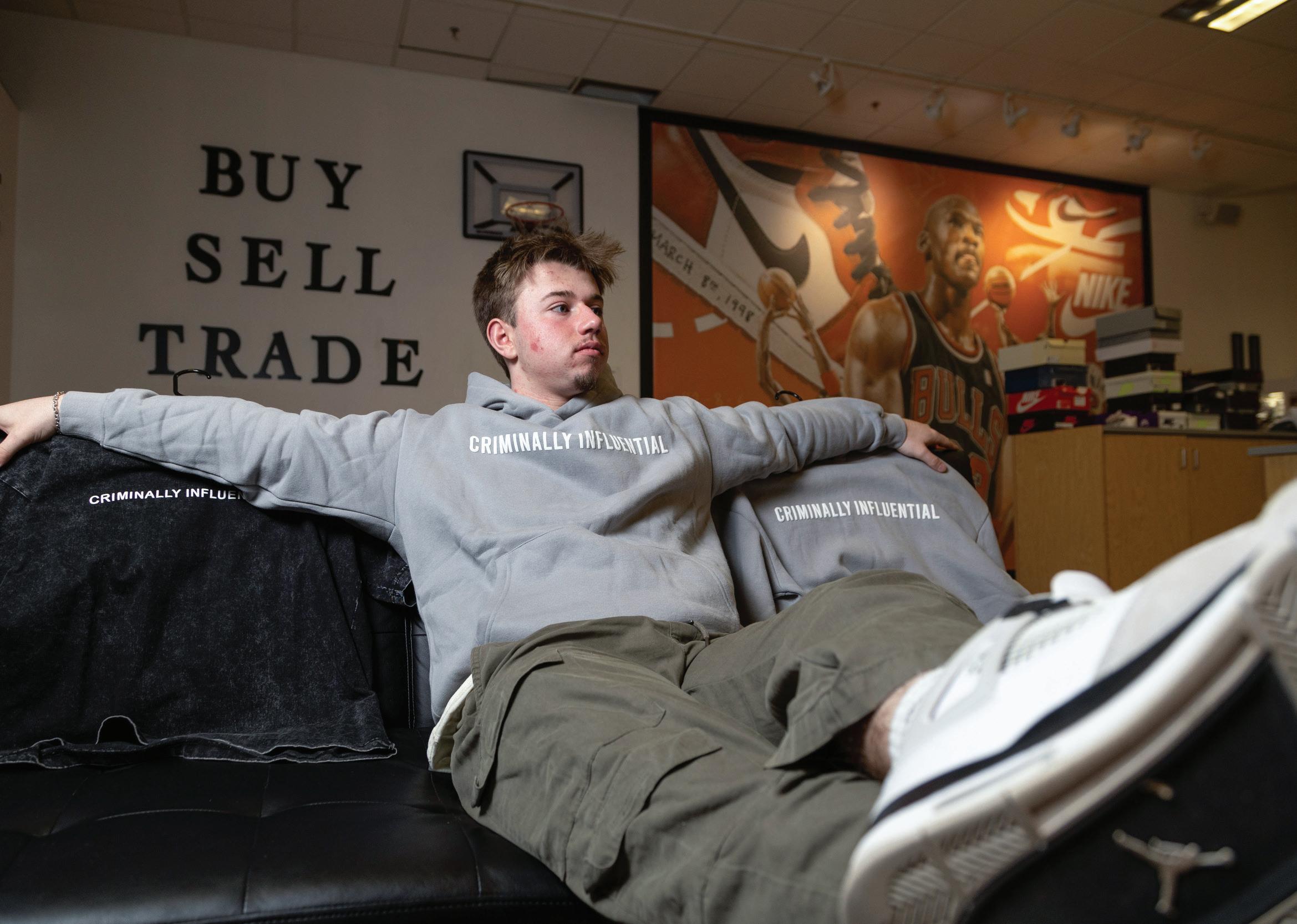
upfront,” Wurtman said.
For Wurtman, the experience of running a business as a full-time student has not only been successful, but overwhelming.
“I would say the experience sometimes is very overwhelming, but it’s also relieving because it is one of my hobbies and it’s nice to come home and know that I’m not worrying about school work and I’m just focusing on making money and doing something I enjoy,” Wurtman said.
While running a small business can be rewarding and help students make a profit, business can sometimes become slow, making it difficult to maintain drive and focus.
“The thing that encouraged me most is my family members just telling me to keep going and then having a few followers on Facebook that stay liking my page and continue ordering,” Wurtman said.
The original startup of her business, however, was one of the most difficult parts of becoming a small business owner.
“You have to buy your vinyl or your blanks and all of that and those things can add up if you’re not getting paid
Wurtman’s best piece of advice to anyone looking to start a business is to just do it.
“If you have the will then you can get at least a few sales and if you push it out there enough then you’ll get more,” Wurtman said.
To order from “Made with Grace,” those interested can find her shop on Facebook @Made with Grace where she will also be posting updates about her upcoming website.
Freshman strategic marketing major Andrew Garrett began his clothing business “Criminally Influential” in April 2023 when he was 17, but just like Wurtman, business has been a part of his life for a long time.
He began by selling various gaming accounts, sports cards and reselling shoes, but “Criminally Influential” was a way to express his love for clothing, creating the slogan “for those who want to take the next step.”
Since Garrett began his business during his senior year of high school, it gave him experience dealing with stress, but moving to college created a different sort of challenge.
“Balancing that and school has been
hard but at the same time it feels very rewarding because it gives me a scapegoat,” Garrett said.
His business allows Garrett to always make some kind of money, but growing online has been difficult for him.
“The problem is, growing online is extremely hard. I think combined on all accounts there’s maybe 500, 600 followers… it’s not easy, but I think I upload a decent amount,” Garrett said.
Luckily for him, he was able to make a connection to a local store to help get his products and name out.
“I made a connection back in December of 2022 when I was selling shoes that was with Remix BG and that’s Remix Shoe Store in the Greenwood Mall … when I first started it, I remember I did a local drop, I went in there and showed it to him and I asked what they thought and they said the quality needed to be upped,” Garrett said.
After making a few changes to his product, he signed a contract with Remix which allowed him to have his clothing in a well-known shop.
“Growing a brand or anything like a business is a process,” Garrett said. “It’s a big process and that’s what I’ve told myself and everyone’s told me,
19
Freshman Andrew Garrett owns a clothing brand called “Criminally Influential.” “I started my brand a random day in April of 2023,” Garrett said. “…Because reselling sneakers and reselling as a whole was dying I decided to just make a random design and tried to make a T-shirt out of it.” Photographed at Remix Shoe Store in the Greenwood Mall on March 29.
it’s a process and processes aren’t quick usually.”
Garrett’s advice to others starting a business is to keep going because it isn’t going to be easy.
“Plenty of people have done it without a retail store to put their stuff in,” Garrett said. “So it’s definitely possible, keep grinding to make good stuff and post everywhere. Any type of exposure you can get whether it be Reddit, X, YouTube, Instagram, TikTok or even a flea market, try to sell stuff.”
To order from “Criminally Influential,” those interested can go to criminallyinfluential.com
In contrast to that, sophomore mechanical engineering major Micah Poole has used their business to combat a specific need on WKU’s campus.
Poole began their business “Salon de Micah” to provide protective hairstyles and hair services to individuals in the Black community.
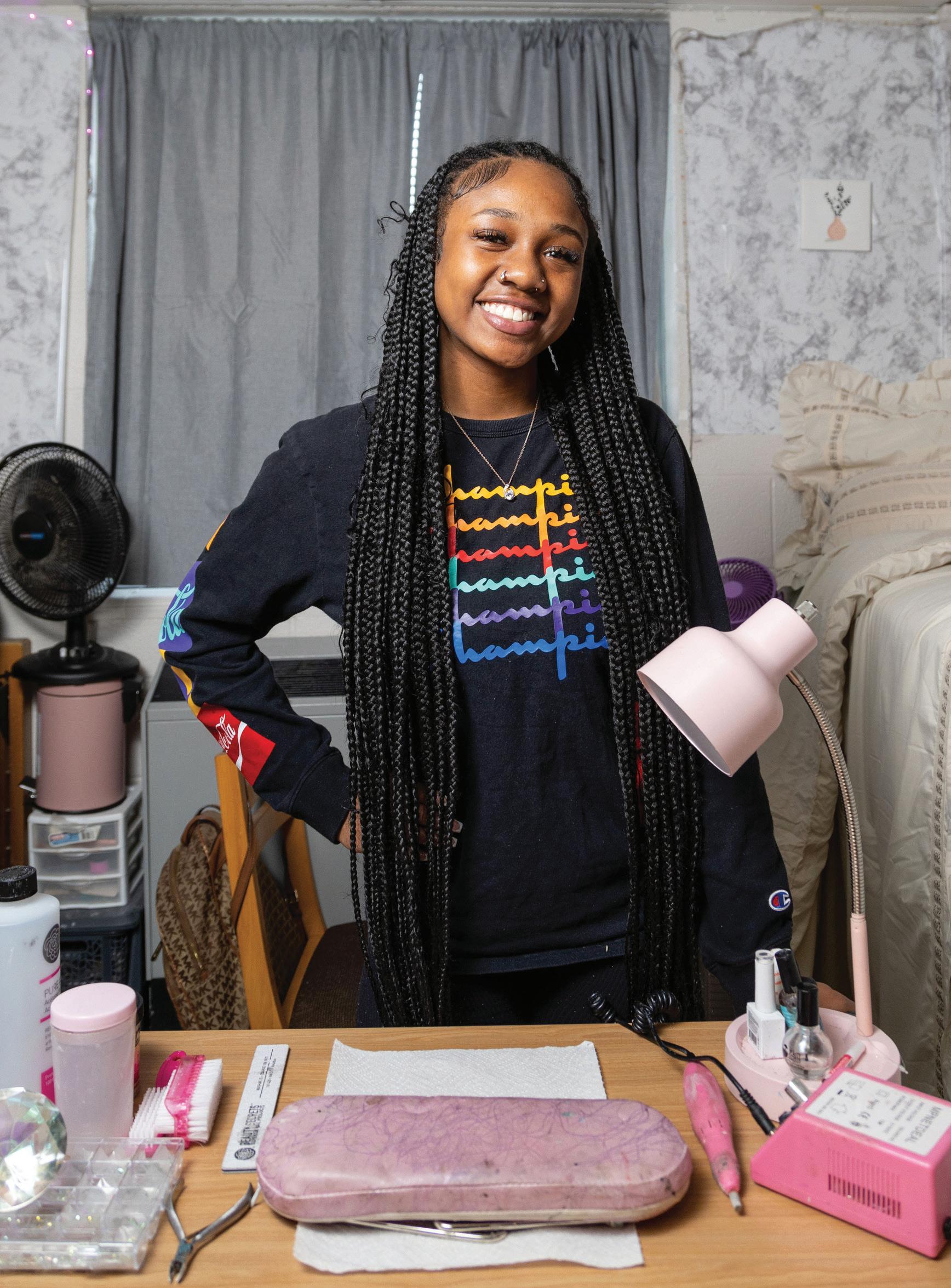
Freshman Brittiny Sadler does nails out of her dorm room as a way to make extra money. “I enjoy doing nails because I love seeing how I can create art from start to finish and literally making something out of nothing,” Sadler said. “I love the bonds I create with my clients. Being home based allows a more intimate experience and I just love welcoming people into a comfortable space filled with good vibes.” Photographed in her dorm room on March 30.
“I know me personally when it comes to my hair, it’s so easy for me to change it because I do hair by myself,” Poole said. “I know at least on a college campus, especially within a PWI [predominately white institution], we don’t have that at least in our space of people that know how to take care of our hair.”
Poole wanted to be there for the WKU community, take care of all types of hairstyles, textures, and choices and create a safe space for the LGBTQ+ community.
Being a member of the WKU Forensics team has allowed Poole to learn to balance their own schedule. This gave them a way to learn to set up a schedule in a very specific way.
“A lot of my clients are part of the LGBTQ+ community, and I guess just being that safe space for them, because I like to call my dorm the ‘safe space,’ and just wanting to be there for people
… Just being that space for them really helps me to continue to do hair,” Poole said.
The most difficult part for Poole has been making sure that their time is respected and knows that if their time is respected, they will respect others.
To learn more about “Salon de Micah” or to make an appointment those interested can go to @micah.part2 or message them on Snapchat @micah_ poole1.
Similarly to Poole, many other small business owners have worked to combat prices, sales and environments of large businesses.
Brittiny Sadler, freshman forensic psychology major, created her business “Nailed by Britt” in December 2021 after being tired of the high prices of nail shops.
Sadler has enjoyed the experience of being a business owner as a full-time college student but admitted that it can be difficult with people who don’t like the business and competition.
“I try to uplift everyone because I’m not the only person who does nails, but we can work together as a team … I’ve also enjoyed how I’m able to have my own schedule,” Sadler said. “I’m my own boss, got my own uniform and have time to meet people around campus just by doing their nails.”
When business is slow for Sadler, she is encouraged by looking at her page and seeing how she has improved from the beginning of her business.
However, doing nails requires a large amount of chemicals which has allowed complaints to arise for Sadler.
“I just try my best to eliminate the smell,” Sadler said. “I even change my products, making sure that it’s still healthy for my client but I’m trying to satisfy everyone.”
To book appointments with “Nailed by Britt” those interested can text Sadler’s personal number 502716-9005 or through her Instagram nail page @nailedbybritt_
“Don’t let anyone stop you and perfect your craft,” Sadler said. “Just keep going and don’t give up because if you give up then you just have to keep starting fresh.”
NewsreporterKayleeHawkinscan bereachedatkaylee.hawkins407@ topper.wku.edu.
20
BIKEWALK BG, WKU CHHS OFFER CHANCES FOR A HEALTHY LIFESTYLE
Story by Larkin Ivory
Bowling Green citizens struggling to balance work, home and a healthy lifestyle will find they have the opportunity to do so, thanks to resources created by other members of the community, who have experienced the same dilemma.
When BikeWalk BG was founded in 2018, Lead Coordinator Karissa Lemon was looking to create a program where people could come together, participate in fitness-based activities and get educated on safely practicing healthy lifestyles. To execute her objective, Lemon relied on a strict set of guidelines that would consistently reinforce her focus.
“There are four main pillars of Bike-
Walk BG. We have education, which is just teaching bicycle and pedestrian safety and skills,” Lemon said. “We choose to use advocacy to represent the community of our citizens. Outreach is the use of community events, while planning is used to work with partner agencies to build more trails for safe biking and walking paths.”
Before BikeWalk BG, there was the Greenways Commission, whose original goal was to plan and build trails across Bowling Green. In the mid2010’s, the commission lost track of its initial vision in the community and passed all the coordination of activities to the Metropolitan Planning Organiza-
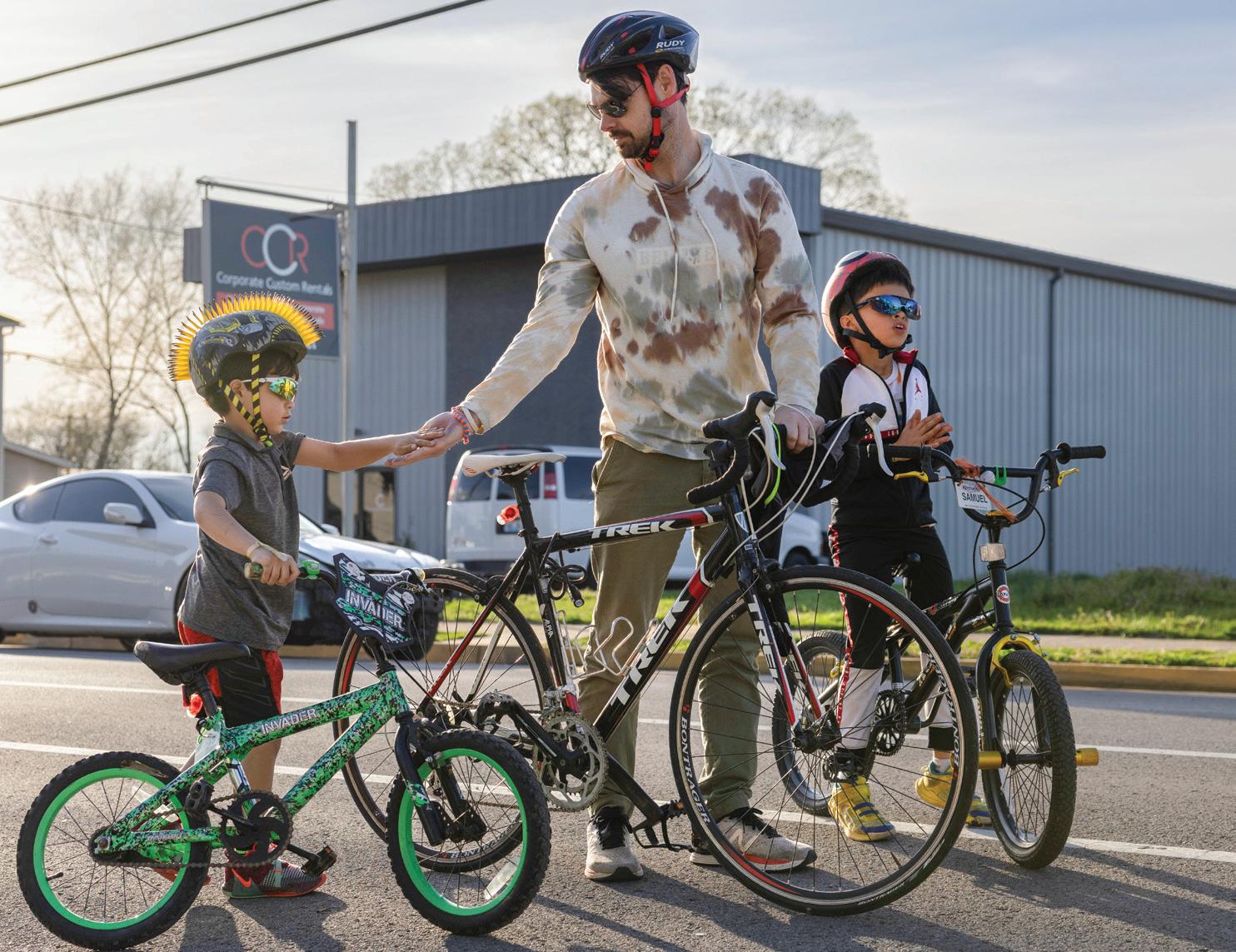 PHOTO BY ALI COSTELLOW
PHOTO BY ALI COSTELLOW
tion (MPO).
MPO is an organization that creates policies, regulates and funds all federal transportation plans in different regions. With the help of MPO, BikeWalk BG was formed as an effort to bring outreach and education for pedestrian and bicycle transportation.
Funding comes from the MPO’s Paula Nye Memorial Grant Foundation. These funds are accumulated by anyone who purchases a “Share The Road” license plate for their vehicles in the state of Kentucky. The money used to purchase these license plates is redirected towards the grant given to communities who apply for the fund to promote bicycle and pedestrian transportation efforts.
BikeWalk BG staffing comes from the City-County Planning Commission of Bowling Green, as well as other smaller partners such as Warren County Parks and Recreation.
BikeWalk BG does various bike ride events throughout the year to bring the community together.
“These aren’t bike rides for serious riders,” Lemon said. “We aren’t looking to break records but we want the community to enjoy an experience together by getting out on a bike and exploring Bowling Green. We’ve had anywhere from six-year-olds to sixty-year-olds attend our events. We hope that these events can change the culture around cycling and help people feel more encouraged to ride their bikes and build confidence while doing so.”
The most recent event the organization held was its St. Patrick’s Community Bike Ride on March 16, where cyclists met at the White Squirrel Brewery to embark on a 10-mile trip and were
21
Participant Kyle Marklin congratulates his sons, six-year-old participant Lucas Marklin (left) and nine-year-old participant Samuel Marklin (right) after completing a 10-mile bike ride at BikeWalk BG’s St. Patrick’s “Community Bike Ride” event on March 16.
invited to a post-celebration that included a food truck and live band. WKU fine arts professor Jason Harbison, who participated in the event, said there was a sense of community that couldn’t be ignored during the trip.
“In my small time participating with BikeWalk BG, I can already tell there’s a strong sense of community,” Harbison said. “The old adage of ‘all walks of life’ and the diverse backgrounds of people that I met prove that it’s very rich in those aspects.”
He also noted that the companionship during the ride was very crucial in helping him complete the 10-mile journey.
“Not only has getting out to ride my bike helped me in a physical standpoint, it’s also helped increase my mental wellness,” Harbison said. “The camaraderie and the scenery help immensely.”
Kyle Marklin, a Bowling Green resident and event participant, brought his 9- and 6-year-old sons who sported Spider-Man and mohawk helmets for the ride.
“I’m always glad when I get the chance to mount up and get the wheels turning again,” Marklin said. “10 miles is a long ride for little ones, but it’s also cool that there is a good mix of seasoned riders as well as newbies.”
Meets for the organization take a lot of planning and coordinating, as oftentimes BikeWalk BG partners with local businesses and other allies to give their events more exposure and activities.
Rowan Brown, a WKU alum, has worked as an intern for BikeWalk BG since May 2023 and contributes to the planning of each event in various ways.
“My work is pretty varied. I prepare for and attend events like community rides, bike rodeos, and booths at large events. I do trail inventories of the greenways to check for maintenance and map trail inspections as well as help manage the social media,” Brown said. “Currently, our bike-ed in schools program is a big focus. I helped write the curriculum and go to the schools to teach it.”
When asked about the future of the organization, they noted an interest in the development of Bowling Green’s trails.
“I would like to see the greenways
become a connected network instead of disconnected segments,” Brown said.
BikeWalk BG also allows groups to participate in their Adopt-A-Trail Program.
“Organizations, non-profits, fraternities and sororities can all adopt a trail for free. We enter an agreement with these groups to provide support in cleaning and maintaining our trails at least four times a year,” Lemon said.
WKU CHHS
At WKU, community members have also seen initiatives put in place to promote healthy lifestyles in the community. The College of Health and Human Services has recently directed this toward their students, faculty and staff.
After the COVID-19 pandemic, head staff at CHHS noticed a trend of struggles for students when coming back to in-person classes. Because of this, Tania Basta, dean of the CHHS, began developing two programs that would increase their quality of life from both a physical and mental standpoint.
For students, Basta and fellow contributors created the CHHS Student Wellness Experience, which was employed in the form of a one-credit hour class for the first year class of 2026 to learn the 10 dimensions of wellness, a model that charts the basic needs of each individual and community to reach full potential. The class is taught by CHHS Student Wellness Navigators Amy Wininger and Marsha Hopper, who not only taught the course to students, but could meet with them individually to keep up with distinct issues and refer them to the appropriate resources.
After a year of implementing the Student Wellness Experience, Basta realized scholars weren’t the only ones struggling with the transition back to traditional schooling.
“It hit me in summer 2022 that faculty and staff were struggling as much as, if not more than, our students. We needed to do something to help them take care of themselves as well. So, we created the CHHS Faculty and Staff Wellness Hour,” Basta wrote in a freelance article for “The Academic Leader.”
The wellness hour is a paid hour each day, in addition to lunch, that allows every faculty and staff member to partici-
pate in an activity that correlates to any of the 10 dimensions of wellness.
Grace Lartey, public health professor and coordinator of the department, likes to spend her hour with fellow staff.
“Sometimes we go out walking on campus for an hour,” Lartey said. “Other times we engage in painting. It’s beneficial to get away from the office for physical health as well as giving our minds a break from work.”
Lartey said the wellness hour benefits everyone on the job, not only her.
“A sound mind is in a sound body,” Lartey said. “The wellness hour is dedicated for staff to take care of themselves. I can’t tell you how much support our staff and faculty provide to us, and I can’t function without them. If they aren’t well enough, my students and I will suffer.”
Since the implementation of both programs, CHHS has found success in the moods and production of students and staff alike. Basta voiced that one student from the 2022-23 academic year made great strides in just a semester difference.
“Last spring, one student wasn’t turning in assignments and was being bullied by her roommate. Her professor referred her anonymously to one of our [wellness] navigators. After meeting with the navigator, the student was able to move to a different dorm and learn better time-management skills,” Basta said to the Herald. “She made all A’s last semester, was on the president’s list and returned to campus this fall.”
For faculty and staff, Basta found that those who participated in the wellness hour reported they were more likely to continue working within the college.
“We’re trying to prioritize the right thing to do,” Basta said. “When you’re in the College of Health and Human Services, we want everybody to feel welcome, know that they belong and feel that they’re able to take care of themselves.”
NewsReporterLarkinIvorycanbe reachedatlarkin.ivory045@topper. wku.edu
22


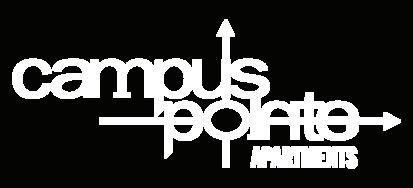
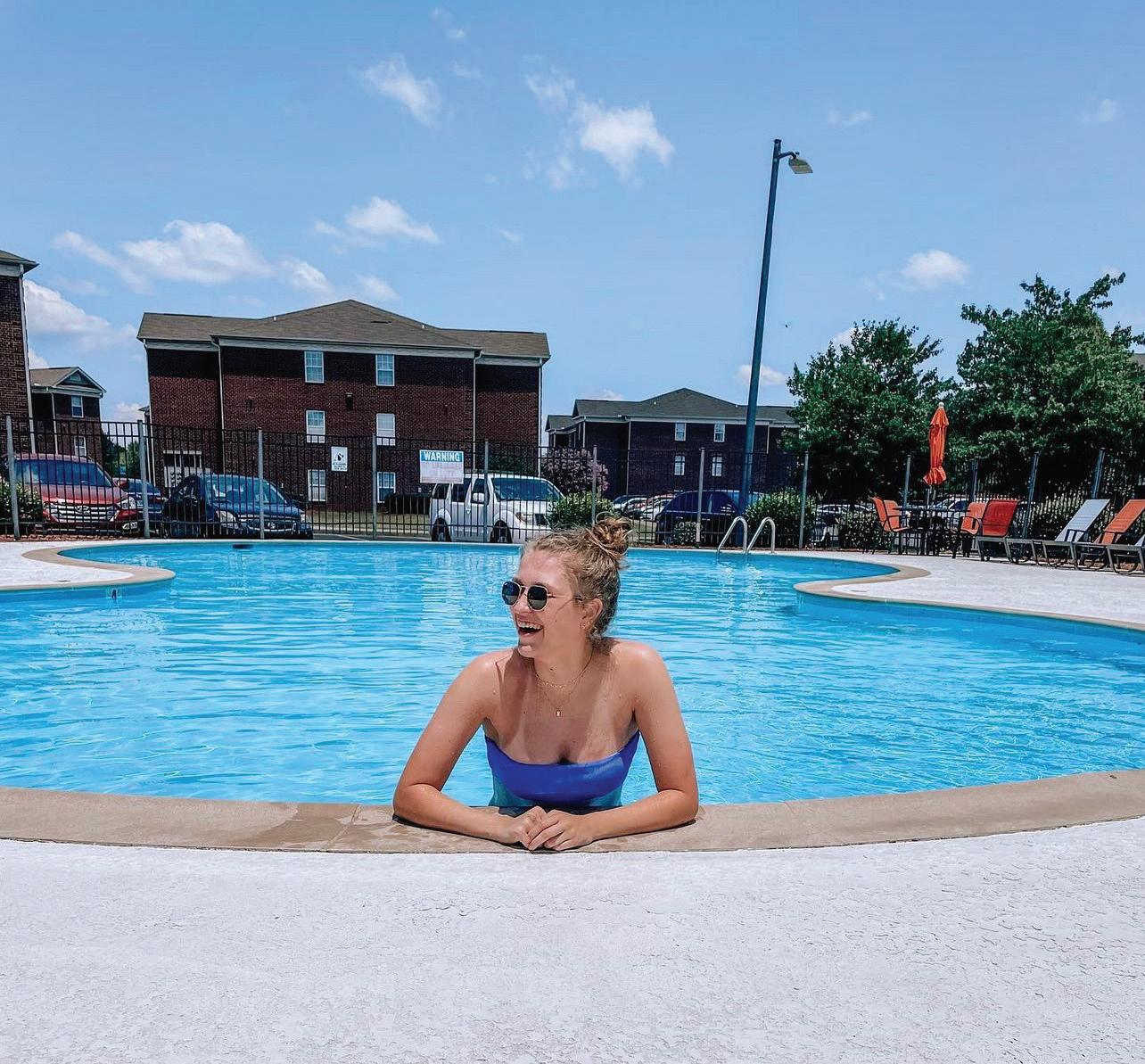
Get to thePointe > > Now leasing for Fall 24-25! Schedule your tour today! www.campuspointewku.com 270-746-9519









 PHOTO BY CARRIE PRATT
PHOTO BY CARRIE PRATT























 PHOTO BY ALI COSTELLOW
PHOTO BY ALI COSTELLOW




